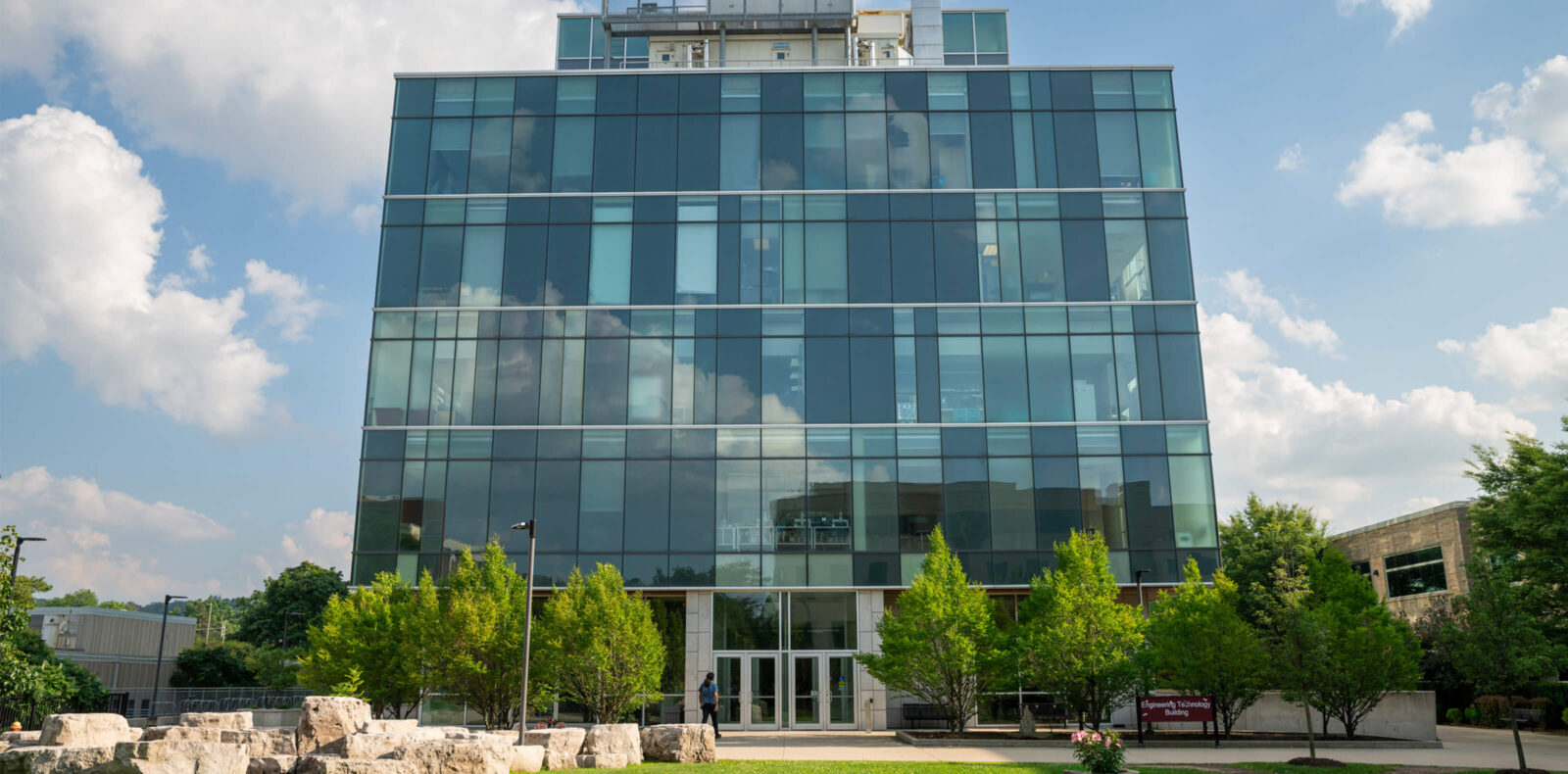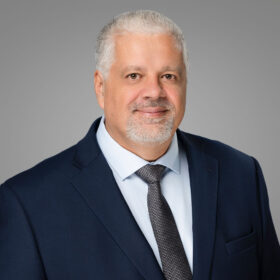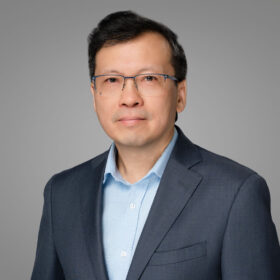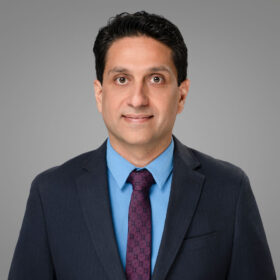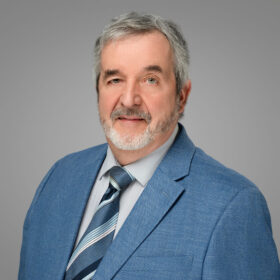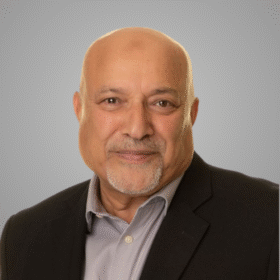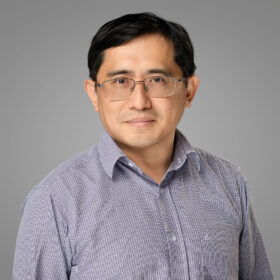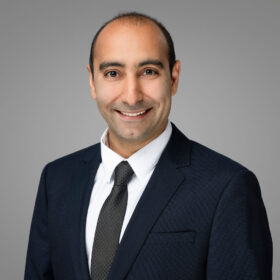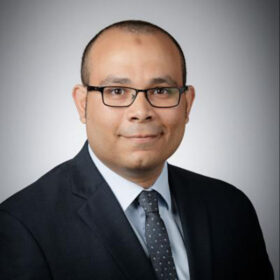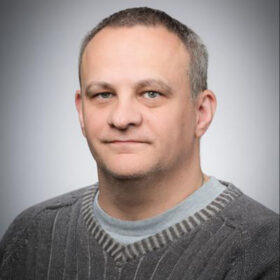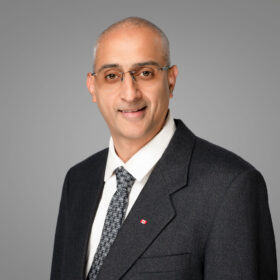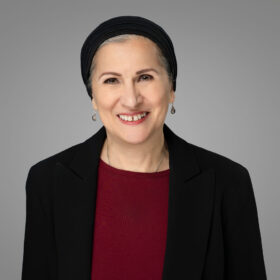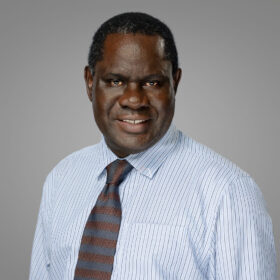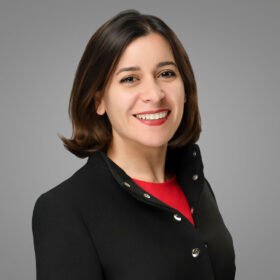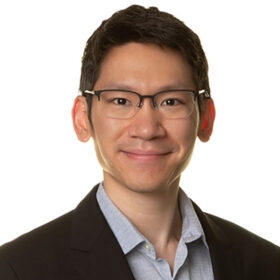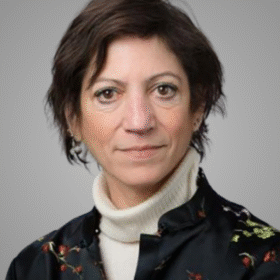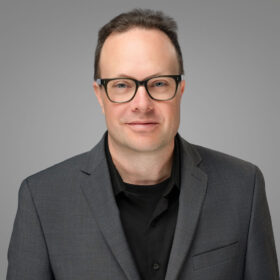-
3 unit(s) Parametric solid modeling for parts with complex geometry. Wireframe and complex surfaces. Multi-component assemblies with kinematic constraints. Fitting and kinematic animations for assemblies. Simulation analysis on solid models. One lab (four hours); second term Prerequisite(s): AUTOTECH 2AE3, 2CD3, and registration in level II or above of the Automotive and Vehicle Engineering Technology program
-
3 unit(s)
Stress and strain; load analysis; failure prediction; impact; fatigue; lubrication and sliding bearings; rolling bearings; shafts and associated parts; gears; fasteners; disassemble and reassemble vehicle systems.
Three lectures, one lab (three hours); first term
Prerequisite(s): ENGTECH 1ME3, 1PH3, and registration in level II or above of the Automotive and Vehicle Engineering Technology program. -
3 unit(s) Two-dimensional drafting: drawing environment and commands, drafting settings, drawing editing, plotting output, dimensioning, orthographic projections and views, sectional and auxiliary views. Three-dimensional solid modeling: parts, assemblies, 2D drawings generation. One lecture, one lab (two hours); first term Prerequisite(s): Registration in level II or above of the Automotive and Vehicle Engineering Technology program
-
3 unit(s) Physical and mechanical properties of materials via tensile, impact and hardness tests and microscopic examination. Application and selection of metals and alloys, ceramics, polymers and composites to the automotive industry, including corrosion prevention. Mechanics of materials such as stress transformations, principal stresses and deflection. Three lectures, one lab (three hours); first term Prerequisite(s): ENGTECH 1CH3, 1ME3, 1PH3, and registration in level II or above of the Automotive and Vehicle Engineering Technology program
-
3 unit(s) Thermodynamic principles; heat engines; gas turbine cycles; air conditioning; conductive, convective and radiative heat transfer, heat transfer coefficients, heat exchangers, vehicle thermal management components and systems. Three lectures, one lab (three hours); second term Prerequisite(s): AUTOTECH 2AE3; ENGTECH 1CH3, 1MT3, 1PH3, and registration in level II or above of the Automotive and Vehicle Engineering Technology program
-
-
3 unit(s) Spark ignition engines; diesel engines, ignition systems, emission control devices, computers and on-board diagnostics; clutches; manual and automatic transmissions and transaxles; driveline; steering systems; suspension systems; brakes; tires and wheels; case studies. Three lectures, one lab (two hours); first term Prerequisite(s): AUTOTECH 2AE3, 2TS3, and registration in level III or above of the Automotive and Vehicle Engineering Technology program
-
3 unit(s) Alternate vehicular power systems: electric hybrid and fuel cell technology. Current and future vehicular powertrain design and control principles for series, parallel and complex hybrid vehicles; conversion of combustion engine vehicles in electric and hybrid vehicles. Three lectures, one lab (three hours every other week); first term Prerequisite(s): AUTOTECH 3AE3, 3CT3, and registration in level IV of the Automotive and Vehicle Engineering Technology program
-
3 unit(s) Analysis and design of closed loop control systems course to include: control system characteristics and performance, stability analysis, system types and performance improvement, digital control systems, compensation, filtering and motion control system analysis and tuning. Three lectures, one lab (three hours every other week); first term Prerequisite(s): ENGTECH 1EL3, 2MT3, and registration in level III or above of the Automotive and Vehicle Engineering Technology program.
-
3 unit(s) Metal-casting processes and equipment; forming and shaping processes and equipment for metals, ceramics and plastics; material-removal processes and machines; joining processes and equipment; surface technology; engineering metrology and instrumentation. Three lectures, one lab (two hours); first term Prerequisite(s): AUTOTECH 2AE3, 2MT3, 3AE3 and registration in level IV of the Automotive and Vehicle Engineering Technology program
-
3 unit(s) Sensors and actuators: analysis, selection and implementation. Programmable logic controllers. Ladder logic and sequential programming. Micro-controller analysis, implementation, and programming. Communication interfaces. Case studies of mechatronic systems, simulation, and testing. Three lectures, one lab (three hours); first term Prerequisite(s): AUTOTECH 3CT3, ENGTECH 1CP3, 1PR3, and registration in level IV of the Automotive and Vehicle Engineering Technology program
-
3 unit(s) Fluid statics; forces on submerged and floating bodies; kinematics of flow and Bernoulli’s equations; dimensional analysis and similarity; flow in closed conduits. Automotive turbomachines, fluid flow around bodies, lift and drag minimization by proper vehicle design. Three lectures, one lab (two hours every other week); first term Prerequisite(s): AUTOTECH 2AE3, 2TS3, and registration in level III or above of the Automotive and Vehicle Engineering Technology program
-
3 unit(s) Single degree of freedom systems; free vibration; harmonically excited vibration; vibration under general forcing conditions; two degree of freedom systems; multi-degree of freedom systems; natural frequencies and mode shapes; vibration control; vehicle oscillations. Three lectures, one lab (two hours every other week); first term Prerequisite(s): AUTOTECH 3AE3, 3CT3, and registration in level IV of the Automotive and Vehicle Engineering Technology program
-
3 unit(s) Internal combustion engine operating characteristics; engine maps; engine cycles; engine configuration and design; air and fuel induction; fluid motion within combustion chamber; heat transfer in engines; friction and lubrication. Three lectures, one lab (two hours every other week); second term Prerequisite(s): AUTOTECH 3AE3 and registration in level IV of the Automotive and Vehicle Engineering Technology program
-
3 unit(s) Problem based learning course in which groups of students research, discuss, and implement conceptual design aspects of electric or hybrid electric vehicles for modern transportation approaches. The engineering and business aspects of vehicle design are analysed from the vehicle specification phase to various levels of automation. Three lectures; first term Prerequisite(s): AUTOTECH 3AE3, 3AV3, 4EC3, ENGTECH 4EE0, and registration in level IV of the Automotive and Vehicle Engineering Technology program
-
3 unit(s)
This course provides a comprehensive exploration of electrochemical energy storage, encompassing the operation and design principles of various battery technologies. Students will acquire a deep understanding of fundamental battery principles, conduct comparative analyses of battery technologies and their practical applications. Additionally, they will delve into the essential electrochemical principles crucial for designing batteries, with a specific focus on their application in Electric Vehicle (EV) technology.
Three lectures; one lab (three hours every other week)
Prerequisite(s): AUTOTECH 3CT3 and Level III in Automotive and Vehicle Engineering Technology -
3 unit(s) Manufacturing planning; flexible manufacturing systems; CIM and quality; emerging CIM technologies; vision systems; robotics; workspace analysis; homogeneous transformation; angle and axis of rotation; Euler angles; manipulator kinematics; trajectories planning; displacement and velocity analyses; Jacobian matrix; redundant sensing of manipulators; manipulator statics; singularities; robot programming. Three lectures, one lab (three hours every other week); first term Prerequisite(s): AUTOTECH 2AC3, 3AE3, ENGTECH 1CP3, ENGTECH 4EE0, and registration in level IV of the Automotive and Vehicle Engineering Technology program
-
3 unit(s) Acceleration performance; braking performance; aerodynamics and rolling resistance; ride; tires; steady-state cornering; suspensions; steering systems; rollover. Three lectures, one lab (two hours every other week); first term Prerequisite(s): AUTOTECH 3VD3, 4MS3; ENGTECH 4EE0, and registration in level IV of the Automotive and Vehicle Engineering Technology program
-
3 unit(s) Intelligent vehicles; vehicle controllers, protocols buses and applications areas such as chassis, steering, braking, traction and stability control etc; and safety critical systems. Three lectures, one lab (three hours); second term Prerequisite(s): AUTOTECH 3CT3, 3MV3, and registration in level IV of the Automotive and Vehicle Engineering Technology program
-
3 unit(s) Kinematic and dynamics of rigid bodies; multi-body dynamic modelling and simulation of automotive dynamics; multi-body systems simulation software; modelling of the full vehicle; complex multi-body dynamic models. Three lectures, one lab (three hours); second term Prerequisite(s): AUTOTECH 3VD3, ENGTECH 3FE3 and one of ENGTECH 3FE3 or 3MN3, and registration in level IV of the Automotive and Vehicle Engineering Technology program
-
1 unit(s) This course requires students to research, design, develop, and implement an independent project and continues as a Technical Report II. The project plan and a model developed will be documented as a technical report and presented in a seminar. One tutorial, one lab (two hours); second term Prerequisite(s): AUTOTECH 3AV3, 3MV3, 3VD3, GENTECH 3MT3, and registration in level IV of the Automotive and Vehicle Engineering Technology program
-
3 unit(s) This course is a continuation of AUTOTECH 4TR1 and it requires the students to conduct further research, modify/refine project design, develop and implement the independent project proposal submitted as a part of the Capstone Design Project I course load. The project will be documented as a technical report and presented in a seminar. One tutorial, one lab (three hours); first term Prerequisite(s): AUTOTECH 3MP3, 4EC3, 4MS3, 4TR1, ENGTECH 4EE0, and registration in level IV of the Automotive and Vehicle Engineering Technology program.
-
3 unit(s) Basic elements of biotechnology. Proteins, enzymes, nucleic acids, DNA manipulation, cloning and recombinant technology, with applications in genetics, medicine and industry. Three lectures, one lab (three hours); second term Prerequisite(s): BIOTECH 2CB3, 2M03, and registration in level II or above of the Biotechnology program Antirequisite(s): BIOTECH 2BE3
-
3 unit(s) Biochemistry and biotechnology; amino acids, nucleotides, nucleic acids, proteins, peptides, enzymes, carbohydrates, lipids, membranes and their functions, metabolism, gene expression and DNA. Three lectures; one lab (three hours every other week); second term Prerequisite(s): BIOTECH 2OC3, and registration in level II or above of the Biotechnology program
-
3 unit(s) An introduction to basic living cell structure, functions, genetics and the fundamentals of metabolism. Three lectures, one lab (three hours every other week); first term Prerequisite(s): ENGTECH 1BI3, 1CH3, and registration in level II or above of the Biotechnology program
-
3 unit(s) Material balances: single and multi-unit systems with possible reactions. Energy balance: energy conservation including enthalpy calculations, steam tables, specific heats, phase changes, and reactions. Survey of momentum, heat and mass transfer; basics of chemical process design. Three lectures, one lab (two and one half hours every other week); first term Prerequisite(s): ENGTECH 1CH3, 1MT3, and registration in level II or above of the Biotechnology program. Antirequisite(s): BIOTECH 3EC3
-
3 unit(s) This course covers the fundamentals of genetic studies including genes and genetic code, DNA, RNA and protein synthesis, cellular reproduction and human genetics. Three lectures; second term Prerequisite(s): ENGTECH 1BI3 and registration in level II or above of the Biotechnology program
-
3 unit(s) Principles of molecular biology that form the basis nucleic acid and protein based methodologies. DNA replication, repair and recombination; bacterial and eukaryotic transcription and RNA processing; translation; and regulation of gene expression. Three lectures, one lab (three hours); first term Prerequisite(s): ENGTECH 1BI3, 1CH3, and registration in level II or above of the Biotechnology program
-
3 unit(s) An introduction to microbiological analysis with emphasis on use of microscopic techniques, staining, cultivation and control of microbial growth, enumeration, identification, potable water analysis, with environmental and industrial applications. Three lectures, one lab (three hours); second term Prerequisite(s): BIOTECH 2CB3, 2M03, and registration in level II or above of the Biotechnology program
-
3 unit(s) This course covers a working knowledge of the major classes of organic compounds, including their physical and chemical properties. The laboratory introduces the techniques of organic synthesis and identification. Three lectures, one lab (three hours); first term Prerequisite(s): ENGTECH 1CH3, and registration in level II or above of the Biotechnology program
-
3 unit(s) A continuation of Biotechnology I including a more in depth application of the recombinant technology and gene expression systems. Applications include microbial, plant, and animal biotechnology, bioremediation, cloning and stem cell technology. Three lectures, one lab (three hours); first term Prerequisite(s): BIOTECH 2B03, 2GT3, 2MB3, and registration in level III or above of the Biotechnology program
-
3 unit(s) Basic control theory and interfacing concepts, design of simple digital controllers, as applied to biological systems with emphasis on biosensors, bioreactors, neural physiology, and homoeostasis. Three lectures, one lab (three hours every other week); first term Prerequisite(s): ENGTECH 1EL3, 2MA3, BIOTECH 2B03, 2EC3, and registration in level III or above of the Biotechnology program
-
3 unit(s) Overview of fermentation technology and bioprocessing, kinetics and thermodynamics of microbial processes. Mass transfer in immobilized systems. Analysis of batch and continuous processes, bioreactor design and analysis, operation and control, instrumentation, oxygen transfer, and scale up. Four lectures, one lab (three hours); first term Prerequisite(s): BIOTECH 2EC3, 3BC3, 3B03, and registration in level IV of the Biotechnology program
-
3 unit(s) This course covers fundamental concepts of computational modeling and applying it to biological systems. Lab component will include programming language to explore/study biological systems. Two lectures, one lab (two hours); first term Prerequisite (s): ENGTECH 1CP3, ENGTECH 2MA3, and registration in level IV of Biotechnology program
-
3 unit(s) An introduction to the microbiology of raw materials used in the manufacturing of food products. The course will review microbial growth and examine the types of microorganisms found in foods, the fermentation process in foods and food borne illness. Three lectures, one lab (three hours every other week); first term Prerequisite(s): BIOTECH 2CB3, 2MB3, and registration in level IV of the Biotechnology program
-
3 unit(s) Structure and function of antibodies, antibody diversity and interactions, immune system and immunity, immunological responses to disease, antibodies production and applications, structure of viruses, methods to study viruses, virus transcriptions and interactions. Three lectures, one lab (three hours); first term Prerequisite(s): BIOTECH 2MB3 and registration in level III or above of the Biotechnology program.
-
3 unit(s) The first part of this course deals with general principles of pharmacokinetics and pharmacodynamics. Implications of the choice of route of administration and dosing will be studied. The second component of the course is systems pharmacology whereby the major drugs affecting different systems of the human body will be explored. Three lectures, one lab (three hours every other week); first term Prerequisite(s): ENGTECH 1CH3, BIOTECH 2BC3, and registration in level IV of the Biotechnology program
-
3 unit(s) The course will familiarize students with the tools and principles of bioinformatics. A toolbox will be used to study access to genomic and proteomic data and data formats and analysis techniques. Three lectures, one lab (three hours); first term Prerequisite(s): BIOTECH 3CM3 or SFWRTECH 4AI3 or 4DA3, and BIOTECH 4GP3, ENGTECH 1CP3, 3ES3, 4EE0, and registration in level IV of the Biotechnology program
-
3 unit(s) Natural and synthetic biopolymers, and other materials for industrial and biomedical engineering applications: biocompatibility; tissue response to implants; inflammation; bioplastics, composites and applications. Three lectures; second term Prerequisite(s): BIOTECH 2BC3, 3B03, and registration in level IV of the Biotechnology program
-
3 unit(s) An introduction to biopharmaceutical drug development and manufacture. Emphasis will include basic genetic engineering principles used in the development and large-scale manufacture of biopharmaceutical products. Three lectures, one lab (three hours); second term Prerequisite(s): BIOTECH 3B03, 3PM3, and registration in level IV of the Biotechnology program
-
-
3 unit(s) This course will familiarize students with current methods of laboratory safety and good lab and manufacturing practices in biotechnology; bioethics issues, benefits and risks of biotechnology applications; provincial, federal and international guidelines/regulations. Three lectures; first term Prerequisite(s): BIOTECH 3PM3, ENGTECH 4EE0, and registration in level IV of the Biotechnology program
-
3 unit(s) This course examines genomics, functional genomics and proteomics. Topics covered are the organization of model system genomes, gene expression profiling at the mRNA and protein levels, microarrays, analyses of interactions, genomic and proteomic databases. Three lectures, one lab (three hours); second term Prerequisite(s): BIOTECH 2M03, 3B03, and registration in level IV of the Biotechnology program
-
-
1 unit(s) This course requires students to research, design, develop, and implement an independent project. The project plan and a model developed will be documented as a technical report and presented in a seminar. One tutorial, one lab (two hours); second term Prerequisite(s): BIOTECH 3BP3, 3FM3, 3PM3, GENTECH 3MT3, and registration in level IV of the Biotechnology program
-
-
3 unit(s) This course is a continuation of BIOTECH 4TR1 and it requires the students to conduct further research, modify/refine the project design, develop, and implement the independent project proposal submitted as a part of the Capstone Project I. The project will be documented as a technical report and presented in a seminar. One tutorial, one lab (three hours); first term Prerequisite(s): BIOTECH 4BL3, 4BM3, 4GP3, 4TR1, ENGTECH 4EE0, and registration in level IV of the Biotechnology program
-
Image processing using machine learning. Convolutional Neural Network (CNN) Architecture and training. Image recognition application. Transfer learning, Image classification, Image segmentation, Image labelling, Clinical imaging. Project 1 – build and train a CNN network (image processing). Recurrent Neural Network (RNN) Architecture; RNN Applications (Time series, Stock market). Deep learning application in Natural language processing. Smart manufacturing: Comparison between deep learning and traditional machine learning, Product quality inspection, Fault assessment, Defect prognosis. Project 2 – build and train a RNN network. Reinforcement learning: Architecture; Application in Robotics, Application in display advertising. Advanced topics: Autoencoders, Deep Residual Networks, Generative Models (GANs). More Applications: Digital & Smart Systems, Energy, Transportation, Micro-Nano Systems, Advanced Manufacturing Project 3 – select one project out of 3-4 themes with data sets to apply deep learning with minimal guidance.
-
Network models of production systems. Simulation software architecture and solution methods. Single period and multiperiod production planning models. Plant data analysis and model building (PCA, PLS). Models comprised of first principles and empirical submodels (hybrid models). Evolutionary optimization (differential evolution, genetic algorithms, particle swarm). Term project.
-
Introduction to AI landscape. Tools for building a machine learning project (Python crash course). Neural Networks Mathematical background. Hyperparameters, Generalization, Training process. Using Python scikit-learn. Project 1 – build and train a neural network using python scikit-learn Neural networks vs deep learning. TensorFlow Applying TensorFlow for Machine learning, Project 2- use TensorFlow/Keras for defining and training a deep learning network (use case). Other DNN frameworks and hardware. Project 3- More complex deep learning challenge (using Google cloud or Azure) .
-
CIVTECH 3GE3 – Geotechnical Materials and Analysis 3 unit(s) Composition of soils, soil identification and classification; compaction; seepage theory; effective stress concept; stresses and displacements using elastic solutions; consolidation theory and settlement. Two lectures, one lab; one term Prerequisite(s): Registration in Civil Engineering Infrastructure Technology
-
CIVTECH 3GT3 – Shear strength characteristics and failure criteria for soils; direct shear, triaxial, plane strain and field tests; earth pressure theory; bearing capacity theory; slope stability and embankment analysis; borehole testing and interpretation.
Two lectures, one lab; one term
Prerequisite(s): CIVTECH 3GE3, ENGTECH 3ML3, ENGTECH 3ET0 and registration in Civil Engineering Infrastructure Technology -
3 unit(s)
Geometric design. Horizontal and vertical alignment, and intersections. Aggregates and soils, asphalt and Portland cement concrete; design of bituminous mixtures; pavement rehabilitation; distress mechanisms; construction techniques; preventative measures.
Three lectures; one term
Prerequisite(s): CIVTECH 3GE3, ENGTECH 3ML3, and registration in Civil Engineering Infrastructure Technology -
3 unit(s)
Structural analysis and modelling of linear elastic truss, beam and frame structures; analysis of determinate and indeterminate structures; matrix stiffness method of analysis.
Three lectures; one term
Prerequisite(s): ENGTECH 3ML3 and registration in Civil Engineering Infrastructure Technology
CIVTECH 4RC3 may be taken concurrently with this course. -
3 unit(s)
Fundamental theories and applications of transportation planning and modelling; short and long range transportation planning; traffic impacts of land development; trip generation and gravity models; software applications.
Two lectures, one lab; one term
Prerequisite(s): ENGTECH 3ST3 and registration in Civil Engineering Infrastructure Technology -
3 unit(s)
Formerly CIVTECH 3BC3.
Topics include building science theory, heat, air and moisture transfer, building envelope, roofing and green roofs, sustainability considerations, assessment, durability, performance, LEED design, codes and regulations.
Three lectures; one term
Prerequisite(s): ENGTECH 3SP3, 4TF3, and registration in Civil Engineering Infrastructure Technology -
3 unit(s)
Bridge elements, structural forms, design loads and required concrete and steel properties. Causes and mechanisms of damage in bridges and of methods of damage detection and assessment. Effective repair materials and techniques and maintenance strategies.
Three lectures; one term
Prerequisite(s): CIVTECH 4RC3 or 4SD3; and registration in the Civil Engineering Infrastructure Technology program
CIVTECH 4RC3 or 4SD3 may be taken concurrently with this course. -
CIVTECH 4LU3 – Formerly CIVTECH 3LU3.
Management of land use; land development and redevelopment processes; infrastructure requirements; land redevelopment; principles and practices of land use planning, legislation and regulations; public consultation; GIS applications.
Three lectures; one term
Prerequisite(s): GENTECH 4SE3 and registration in Civil Engineering Infrastructure Technology -
3 unit(s)
Fluid mechanics applications in civil engineering. Topics include; flow in open channels, hydraulic jump, weirs and spillways, forces on immersed bodies, pumps in series/parallel and fluid measurements.
Three lectures; one term
Prerequisite(s): ENGTECH 3ET0, one of CIVTECH 3FM3, ENGTECH 4TF3, and registration in Civil Engineering Infrastructure Technology -
3 unit(s)
Formerly CIVTECH 3RC3
Design by limit states methods to ensure adequate capacities for bending moment, shear and diagonal tension, axial force; and design to satisfy serviceability requirements.
Three lectures; one term
Prerequisite(s): CIVTECH 3SA3, and registration in Civil Engineering Infrastructure Technology
CIVTECH 3SA3 may be taken concurrently with this course. -
3 unit(s)
Limit states design methods to ensure capacities for bending moment, shear and diagonal tension, axial force; serviceability requirements; failure analysis for common structural materials.
Three lectures; one term
Prerequisite(s): CIVTECH 3SA3 and registration in Civil Engineering Infrastructure Technology -
3 unit(s)
Formerly CIVTECH 3UM3.
Introduction to utilities products and networks. Planning and management tools for infrastructure, including inventory management, needs assessment, demand management and investment decisions.
Three lectures; one term
Prerequisite(s): GENTECH 3EE3 and registration in Civil Engineering Infrastructure Technology -
3 unit(s)
Formerly CIVTECH 3WT3.
Design, maintenance and rehabilitation of municipal water systems. This includes drinking water distribution systems, sewage and rainwater collection, management and pumping. Land development and population forecasting as it relates to water and wastewater
demand.
Three lectures; one term
Prerequisite(s): ENGTECH 4TF3 and registration in Civil Engineering Infrastructure Technology -
3 unit(s) Introduction to laboratory procedures used in chemical analysis for classical wet and instrumental methods; statistical data treatment, gravimetric analysis, volumetric analysis, pH measurements and optical methods. Three lectures, one lab (three hours); second term Prerequisite(s): ENGTECH 1CH3 and registration Automation Engineering Technology or Biotechnology
-
3 unit(s) This course provides basic introduction to the following topics: chemistry of life, cells, genetics, evolution and diversity and plant and animal form and function. Two lectures, one lab (three hours every other week); second term Prerequisite(s): Registration in Biotechnology
-
-
3 unit(s) Basic chemical concepts, calculations and laboratory procedures. Chemical formulae and equations, chemical stoichiometry, nomenclature, acids and bases, gases, chemical equilibrium, thermochemistry and thermodynamics, redox reactions and electrochemistry. Three lectures, one tutorial, one lab (three hours every other week); first term Prerequisite(s): Registration in Automation Engineering Technology, or Automotive and Vehicle Engineering Technology, or Biotechnology
-
3 unit(s) Programming concepts and introduction to C++ programming. C++ syntax, functions, decision-making, looping, operators, and arrays. Two lectures, one lab (two hours); first term Prerequisite(s): Registration in Automation Engineering Technology, or Automotive and Vehicle Engineering Technology Antirequisite(s): COMPTECH 3PD3
-
3 unit(s) Introduction to electronic circuits; DC and AC sources, resistors, inductors, and capacitors; phasors and impedance; transient and steady-state analysis; network analysis; energy and power. Four lectures, one lab (three hours); second term Prerequisite(s): Registration in Automation Engineering Technology, or Automotive and Vehicle Engineering Technology, or Biotechnology
-
Orientation to Technology Co-op programs and the workplace; self-assessment and goal setting; application procedures and materials; occupational health and safety. Prerequisite(s): Registration in a Degree Completion Technology program
-
3 unit(s) Pre-calculus concepts: algebra, trigonometry, complex numbers, exponential and logarithmic functions, systems of equations, matrices, determinants and vectors. Limits, continuity, differential calculus, partial derivatives, applications, sequences and series. Four lectures; first term Prerequisite(s): Registration in Automation Engineering Technology, or Automotive and Vehicle Engineering Technology, or Biotechnology
-
3 unit(s) Statics and kinematics of particles and rigid bodies: force vectors; equilibrium; trusses, frames and machines; internal forces; centroids; friction; axial load, torsion, bending and shear; stress and strain. Newton’s Second Law; moments of inertia; plane motion. Four lectures; second term Prerequisite(s): Registration in Automotive and Vehicle Engineering Technology
-
3 unit(s) Integral calculus involving all the techniques of integration, applications, improper integrals, multiple integrals and integral theorems, infinite sequences and series. Four lectures; second term Prerequisite(s): ENGTECH 1MC3 and registration Automation Engineering Technology, or Automotive and Vehicle Engineering Technology, or Biotechnology
-
3 unit(s) Sound, light, kinematics, forces, work, energy, fluid and thermal physics. Four lectures, one lab (two hours every other week); first term Prerequisite(s): Registration in Automation Engineering Technology, or Automotive and Vehicle Engineering Technology, or Biotechnology
-
3 unit(s) Programming concepts and introduction to Python programming. Python syntax, functions, decision-making, looping, operators, arrays and data structures. Two lectures, one lab (two hours); first term Prerequisite(s): Registration in Biotechnology
-
3 unit(s) Project-based course covering computer programming. Pointers, structured data, object-oriented concepts, inheritance, polymorphism, abstract class and overloading functions. Two lectures, one lab (two hours); second term Prerequisite(s): ENGTECH 1CP3 and registration in Automation Engineering Technology or Automotive and Vehicle Engineering Technology
-
0 unit(s) Minimum of 15 weeks of full-time employment in a professional environment. First term Prerequisite(s): GENTECH 2PW3 and registration in a Four-Year Technology Program and permission of the Centre for Career Growth and Experience (the Centre).
-
3 unit(s) An introductory statistics course covering the following topics with engineering applications: organization and description of data, probability and distributions, confidence intervals and hypothesis testing and bivariate data analysis using regression. Two lectures, one tutorial; first term Prerequisite(s): ENGTECH 1MT3; and registration in Automotive and Vehicle Engineering Technology Antirequisite(s): ENGTECH 3ES3, 3ST3
-
Minimum of 15 weeks of full-time employment in a professional environment. Prerequisite(s): ENGTECH 1ET0, registration in a Degree Completion Technology Co-op program, and permission of the Centre for Career Growth and Experience (the Centre)
-
3 unit(s) Techniques for solving first and second order ordinary differential equations with applications; initial value and boundary value problems, systems of differential equations, partial differential equations.
Two lectures, two tutorials; first term. Prerequisite(s): ENGTECH 1MT3; and registration in Automation Systems Engineering Technology, Automotive and Vehicle Engineering Technology, or Biotechnology -
3 unit(s) Number systems and errors; solutions to nonlinear equations; interpolation by polynomials; matrices and systems of linear equations; differentiation and integration; differential equations; applications to mechanical systems. Three lectures; second term Prerequisite(s): ENGTECH 1CP3, ENGTECH 1MT3; and registration in Automotive and Vehicle Engineering Technology Antirequisite(s): CIVTECH 3MN3, ENGTECH 3MN3
-
3 unit(s) Continuous time signals and systems; convolution; Laplace transform, Fourier series and transform; Discrete time signals and systems. Four lectures; second term Prerequisite(s): ENGTECH 2MA3; and registration in Automation Engineering Technology or Automotive and Vehicle Engineering Technology
-
3 unit(s) Fundamental discrete mathematics concepts relevant to IT: sets, relations, functions, graphs, propositional logic. State machines. Input/output specifications. Invariants. Three lectures; one term Prerequisite(s): Registration in Software Engineering Technology
-
0 unit(s) Minimum of 15 weeks of full-time employment in a professional environment. First term Prerequisite(s): ENGTECH 2EE0; registration in a Four-Year Technology Program; and permission of the Centre for Career Growth and Experience (the Centre)
-
3 unit(s) An introductory statistics course covering the following topics with engineering applications: organization and description of data, probability and distributions, confidence intervals and hypothesis testing and bivariate data analysis using regression. Two lectures, one tutorial; first term Prerequisite(s): ENGTECH 1MT3; and registration in Level III of Automation Engineering Technology or Biotechnology Antirequisite(s): ENGTECH 2ES3, 3ST3
-
Minimum of 15 weeks of full-time employment in a professional environment. Prerequisite(s): ENGTECH 2ET0, registration in a Degree Completion Technology Co-op program, and permission of the Centre for Career Growth and Experience (the Centre)
-
3 unit(s) Matrix techniques; eigenvalue problems: equations of elasticity: plane stress, plane strain, 3D problems; variational methods; element types, element stiffness, mass matrices and load vector; assemblage of elements, boundary conditions. Two lectures; first term Prerequisite(s): AUTOTECH 2AC3, AUTOTECH 2TS3, and registration in Level III of Automotive and Vehicle Engineering Technology Antirequisite(s): ENGTECH 4FA3
-
3 unit(s) Ordinary and partial differential equations; Laplace transforms; Fourier series; vector calculus; integral theorems, with engineering applications. Three lectures; one term Prerequisite(s): Registration in Civil Engineering Infrastructure Technology, Manufacturing Engineering Technology, Power and Energy Engineering Technology, or Software Engineering Technology
-
-
3 unit(s) Stresses under combined loads, generalized Hooke’s Law; two and three dimensional stresses, stress transformation, principal stresses, Mohr’s circle; deflections by integration; energy methods, Castagliano’s theorem; columns; yield criteria. Three lectures; one term Prerequisite(s): ENGTECH 3MA3, 3SD3, and registration in Civil Engineering Infrastructure Technology or Manufacturing Engineering Technology
-
3 unit(s) Number systems and errors; solutions to nonlinear equations; interpolation by polynomials; matrices and systems of linear equations; differentiation and integration; differential equations; applications to mechanical systems. Two lectures, one tutorial; first term Prerequisite(s): ENGTECH 1CP3, ENGTECH 2MA3; and registration in Level IV or above of Automation Engineering Technology Antirequisite(s): CIVTECH 3MN3, ENGTECH 2MS3
-
3 unit(s) Two and three dimensional force vectors, equilibrium of a particle; moments and couples; equilibrium rigid bodies; centroids, second moment of area, moment of inertia; truss, and static analysis. Planar kinematics and planar kinetics of particles and rigid bones; work and energy, impulse, and momentum. Two lectures, one lab; one term Prerequisite(s): Registration in Civil Engineering Infrastructure Technology or Manufacturing Engineering Technology Antirequisite(s): MANTECH 3MD3
-
3 unit(s) Structure of crystalline solids; imperfections in solids; mechanical properties of metals, dislocations and strengthening mechanisms, failure, phase diagrams, phase transformation in metals, processing of metal alloys, composites, structures and properties of ceramics, processing of ceramics. Three lectures; one term Prerequisite(s): Registration in Civil Engineering Infrastructure Technology or Manufacturing Engineering Technology Antirequisite(s): ENG TECH 3MN3
-
3 unit(s) Probability and statistics for engineering and technology. Descriptive statistics, discrete and continuous random variables and probability distributions, confidence intervals, hypothesis testing, analysis of variance, correlation and regression. Three lectures; one term Prerequisite(s): ENGTECH 3MA3 and registration in Civil Engineering Infrastructure Technology or Software Engineering Technology Antirequisite(s): ENGTECH 3ES3
-
3 unit(s) Introduction to thermodynamics, properties of pure substances, first and second laws of thermodynamics, entropy, vapor power cycles, refrigeration cycles, and combined power cycles. Three lectures; one term Prerequisite(s): ENGTECH 3MA3 and registration in Manufacturing Engineering Technology or Power and Energy Engineering Technology Antirequisite(s): ENRTECH 3TD3, MANTECH 3TF3
-
3 unit(s) Theories and practice of machine intelligence with focus on statistical learning methods, artificial neural networks, naturally inspired algorithms, deep learning, big data management, and pattern recognition.
Three lectures, one term; completely virtual. Prerequisite(s): Registration in level IV of Biotechnology, Automotive and Vehicle Engineering Technology, OR ENGTECH 3ET0and registration in Manufacturing Engineering Technology or Power and Energy Engineering Technology OR MECHENG 4RO3 or IBEHS 4AO3 and registration in any Mechanical Engineering Program. Antirequisite(s): SMRTTECH 4AI3, MANTECH 4AI3, SFWRTECH 4AI3 -
3 unit(s) Mathematical models of physical systems; differential equations, Laplace transforms; block diagrams, transfer functions; system transient response; stability analysis in s-, frequency-, and time-domain; Routh-Hurwitz criteria, root-locus analysis, Bode plots, Nyquist criterion, state-space representation; simple PID control systems; lead-lag compensation; digital simulations of control systems. Three lectures; one term Prerequisite(s): ENGTECH 3MA3 and registration in Power and Energy Engineering Technology or Manufacturing Engineering Technology Antirequisite(s): ENGTECH 3CT3, ENRTECH 3CT3, 4CT3
-
3 unit(s) This course enables students to identify and document the engineering design and technology skills acquired through experiential learning in technically oriented McMaster Engineering Teams. Arrangements for participation must be made with the faculty supervisor of the Team prior to enrollment.
One lecture (three hours), fall term. Prerequisite(s): Registration in Level 3 or above in Automation Systems Engineering Technology or Automotive and Vehicle Engineering Technology. Antirequisite(s): ENGINEER 4EX3 A/B -
3 unit(s) A project involving design and synthesis that reinforces concepts gained from previous semesters. Such a project involves research, design, and assessment. Two lectures, one lab; one term Prerequisite(s): CIVTECH 4SD3 or 4RC3; and registration in Level IV of Civil Engineering Infrastructure Technology CIVTECH 4SD3 or 4RC3 may be taken concurrently with this course.
-
0 unit(s) Minimum of 15 weeks of full-time employment in a professional environment. Prerequisite(s): ENGTECH 3EE0; registration in a Four-Year Technology Program; and permission of the Centre for Career Growth and Experience (the Centre)
-
0 unit(s) Minimum of 15 weeks of full-time employment in a professional environment. Prerequisite(s): ENGTECH 4EE0; registration in a Four-Year Technology program; and permission of the Centre for Career Growth and Experience (the Centre)
-
3 unit(s) Formerly ENGTECH 3FA3. Matrix techniques, eigenvalue problems, equation of elasticity, 3D problems, variational methods, element types, element stiffness, mass matrix and load vector, assemblage of elements, boundary conditions. Two lectures, one lab; one term Prerequisite(s): ENGTECH 3ML3 and ENGTECH 4MA3 or CIVTECH 3MN3, and registration in Civil Engineering Infrastructure Technology or Manufacturing Engineering Technology Antirequisite(s): ENGTECH 3FE3
-
3 unit(s) Project-based course using the agglomeration of previously acquired knowledge. Research, design, implement and document a software solution to a problem in a real-world application domain. Three lectures, one term Prerequisite(s): Registration in Level IV Software Engineering Technology Antirequisite(s): SFWRTECH 4FD3
-
3 unit(s) Sequence and series, Fourier series, Matrix algebra, Formulating engineering process models, Numerical solutions techniques, Root findings, Curve fittings, Numerical integration, Numerical differentiation, Ordinary differential equations. Three lectures; one term Prerequisite(s): ENGTECH 3MA3 and registration in Civil Engineering Infrastructure Technology, Manufacturing Engineering Technology or Power and Energy Engineering Technology Antirequisite(s): CIVTECH 3MN3
-
3 unit(s) Fluid statics, flow in closed conduits, dimensional analysis and similarity, energy and Bernoulli’s equation, flow kinematics, hydraulic cross-sections, energy loss in piping system, fluid Machinery. Three lectures, one lab; one term Prerequisite(s): ENGTECH 3MA3 and registration in Civil Engineering Infrastructure Technology, Manufacturing Engineering Technology or Power and Energy Engineering Technology Antirequisite(s): AUTOTECH 3TS3
-
-
3 unit(s)
Signal and system representations, Fourier transform and LTI systems, filtering; analog communication systems: amplitude modulation, frequency modulation and phase modulation; digital communication systems: pulse modulation, digital transmission at baseband, digital modulation techniques: amplitude-shift keying, phase-shift keying, and frequency-shift keying.
Three lectures; one term
Prerequisite(s): ENGTECH 3MA3 and registration in Power and Energy Engineering Technology -
3 unit(s)
Formerly ENRTECH 4EM3
Field concepts. Maxwell’s equations, integral and differential forms. Free space and guided wave propagation, transmission lines. Radiation from current elements.
Three lectures; one term
Prerequisite(s): ENRTECH 3EP3, ENGTECH 3MA3 and registration in Power and Energy Engineering Technology -
3 unit(s) Basic electric circuits, basic electrical theorems, network analysis, phasors, three phase systems, transformers, motors, electric power generation, power plants components (transformers, motors, exciters, synchronous machines). Three lectures; one lab (two hours every other week); one term Prerequisite(s): Registration in Power and Energy Engineering Technology
-
3 unit(s) Corporate and industrial network standards; proprietary buses and protocols and interfaces; distributed I/O; drivers and devices and their implementation in PC and PLC based systems. Three lectures; one lab (two hours every other week); one term Prerequisite(s): Registration in Power and Energy Engineering Technology
-
3 unit(s) Transducers, logic circuits, basic electronic devices and their applications. Calculate/measure the input(s) and output(s) of various systems. Recognize, install and apply instruments within power plants. Three lectures; one lab (two hours every other week); one term Prerequisite(s): Registration in Power and Energy Engineering Technology
-
3 unit(s) Principle concepts and theories of power distribution. Skills required to work at an industrial environment and/or power utilities (generation, transmission, distribution). Based on the Ontario Hydro system, a power flow computer program will be introduced. Three lectures; one term Prerequisite(s): ENRTECH 3EP3 and registration in Power and Energy Engineering Technology
-
3 unit(s)
Analysis of load flow, short circuit, transient stability and electromagnetic transients by commercial power system software packages.
Three lectures; one term
Prerequisite(s): ENGTECH 3ET0, ENRTECH 3PD3, 4PM3, and registration in Power and Energy Engineering Technology -
3 unit(s)
This course introduces the different types of operating constraints as encountered by power system operators and engineers during real time operation of interconnected power grids. For each type of operating constraint, the most common operating strategies and control measures will be discussed and analyzed.
Three lectures; one term
Prerequisite(s): ENRTECH 3PD3 and registration in Power and Energy Engineering Technology -
3 unit(s)
Introduction to power semiconductor switching devices: power diodes, thyristors, IGBTs, MOSFETs; four types of converters in power conditioning: DC-DC, DC-AC, AC-DC, and AC-AC. Applications of power electronics in electric power transmission and distribution: static var compensators (SVCs), static synchronous condensers (STATCOM), voltage source converters (VSC) and HVDC transmission.
Three lectures; one term
Prerequisite(s): ENRTECH 3EP3, ENGTECH 3MA3, ENRTECH 3PD3, and registration in Power and Energy Engineering Technology
Antirequisite(s): ENRTECH 3IE3 -
3 unit(s) Various power devices such as relays, circuit breaker, power monitor, control devices and other components used in a power system protection. Other devices such as CTs, and Pts and substation hardware will also be covered.
Three lectures; one term
Prerequisite(s): ENRTECH 3MI3, 3PD3, and registration in Power and Energy Engineering Technology -
3 unit(s) New generation of digital fault detection systems. Balanced faults, computer-based fault studies, symmetrical components and sequence networks, unbalanced short-circuit and open-circuit faults.
Three lectures; one lab (two hours every other week); one term
Prerequisite(s): ENGTECH 3ET0, ENRTECH 4PM3 and registration in Power and Energy Engineering Technology -
3 unit(s) Operation and planning of renewable generation resources including wind, solar, hydro, biomass, geothermal and fuel cells. The environmental and economical impacts of such technologies, rules, regulations.
Three lectures; one term
Prerequisite(s): ENRTECH 3EP3, ENGTECH 3TD3, and registration in Power and Energy Engineering Technology
Antirequisite(s): ENRTECH 4RT3 -
3 unit(s)
Students are given an introduction to the functional areas within businesses and an overview of the local and global business environments. The fundamentals of micro-economics and macro-economics are introduced, as well as sustainability in the environment of business.
Two lectures; one tutorial (one hour); second term
Prerequisite(s): Registration in Automation Systems Engineering Technology, Automotive and Vehicle Engineering Technology, or Biotechnology -
3 unit(s)
Students will develop their written and oral communications skills with an emphasis on styles appropriate for a technology-based workplace including technical report writing. They will also develop their teamwork, problem solving, and research skills.
Two lectures; one tutorial (two hours): first term
Prerequisite(s): Registration in Automation Systems Engineering Technology, Automotive and Vehicle Engineering Technology, or Biotechnology
Antirequisite(s): GENTECH 1CS3, 1CZ3, 3TC3, 4TC3, SFGNTECH 4TC3 -
3 unit(s) Costing methods of engineering designs and processes; minimum attractive rate of return, return sensitivities, time value of money, internal rates of return, pay-back period, amortization of equipment and capital cost allowance structures. Three lectures; second term Prerequisite(s): Registration in Level II of Automation Systems Engineering Technology, Automotive and Vehicle Engineering Technology, or Biotechnology. Antirequisite(s): GENTECH 3EE3, SFGNTECH 3EE3
-
3 unit(s) This course provides and overview and introduction to the human resource functions that support an organizations goals and objectives. Topics include: Designing and analyzing jobs; recruitment and selection; onboarding and training; career development; and performance management. Three lectures: first term Prerequisite(s): Registration in Level II Automation Engineering Technology, Automotive and Vehicle Engineering Technology, or Biotechnology Antirequisite(s): GENTECH 1HR3
-
3 unit(s) The course examines fundamental management principles of planning, organizing, leading, and controlling in technology organizations. Emphasis is placed on understanding and application of human resource management practices to engage people in attaining organizational goals. Three lectures: second term Prerequisite(s): Registration in Level II Automation Engineering Technology, Automotive and Vehicle Engineering Technology, or Biotechnology Antirequisite(s): GENTECH 1HR3, 1OB3, 3MP3, 3OB3, 4T03, SFGNTECH 3MB3
-
3 unit(s) This course is a blend of hands-on and theoretical treatment on the subject of creating new technological product and service value in our society. Three lectures; one term; may be offered in an in-person or virtual format Prerequisite(s): Registration in Civil Engineering Infrastructure Technology, Manufacturing Engineering Technology, or Power and Energy Engineering Technology Antirequisite(s): SFGNTECH 3DM3
-
3 unit(s) Costing methods for engineering designs and processes; minimum attractive rate of return, return sensitivities, time value of money, internal rates of return, payback period, amortization of equipment and capital cost allowance structures.
Three lectures; one term; may be offered in an in-person or virtual format
Prerequisite(s): Registration in Civil Engineering Infrastructure Technology, Manufacturing Engineering Technology, or Power and Energy Engineering Technology
Antirequisite(s): GENTECH 1EE3, 2EE3, SFGNTECH 3EE3 -
3 unit(s) The course focuses on departmental budget methodologies, understanding and interpretation of various financial statement components in terms of their relevance to managerial decision making.
Three lectures; first term
Prerequisite(s): Registration in Level II or above of Automation Systems Engineering Technology, Automotive and Vehicle Engineering Technology, or Biotechnology
Antirequisite(s): GENTECH 1FS3, 1FT3, 3FS3, SFGNTECH 3FS3 -
3 unit(s)
The course focuses on departmental budget methodologies, understanding and interpretation of various financial statement components in terms of their relevance to managerial decision making.
Three lectures; one term; may be offered in an in-person or virtual format
Prerequisite(s): Registration in Civil Engineering Infrastructure Technology, Manufacturing Engineering Technology, or Power and Energy Engineering Technology
Antirequisite(s): GENTECH 1FS3, 1FT3, 3FF3, SFGNTECH 3FS3 -
3 unit(s) Statistical tools, tests, design and analysis of planned experiments, Taguchi methods, control charts for variables and attributes, capability analysis, acceptance sampling, elements of reliability, quality assurance, and ISO 9000 certification.
Three lectures; first term.
Prerequisite(s): ENGTECH 2ES3 or 3ES3; and registration in Level II or above Automation Systems Engineering Technology, Automotive and Vehicle Engineering Technology, or Biotechnology
Antirequisite(s): GENTECH 3T03, 4SS3 -
3 unit(s)
This course introduces the 4Ps of marketing: product, price, promotion, and place with a Business-to-Business focus. Global and high technology markets and their unique challenges will be presented. Students will learn to make marketing decisions within a strategic framework.
Three lectures; first term
Prerequisite(s): Registration in Level III or above of Automation Systems Engineering Technology, Automotive and Vehicle Engineering Technology, or Biotechnology
Antirequisite(s): GENTECH 4MK3, 4MB3, 4TS3, SFGNTECH 4MK3 -
3 unit(s) The course examines fundamental management principles of planning, organizing, leading and controlling in technology organizations. Emphasis is placed on understanding and application of human resource management practices to engage people in attaining organizational goals. Three lectures; one term; may be offered in an in-person or virtual format Prerequisite(s): Registration in Civil Engineering Infrastructure Technology, Manufacturing Engineering Technology, or Power and Energy Engineering Technology Antirequisite(s): GENTECH 2MP3, 3OB3, SFGNTECH 3MP3
-
3 unit(s) Introduction to best practice in the management of technical projects including the use of planning, software and the management of people. Three lectures; first term Prerequisite(s): GENTECH 2MP3 and registration in Level II or above of Automation Engineering Technology, Automotive and Vehicle Engineering Technology, or Biotechnology Antirequisite(s): GENTECH 3PM3, 4PM3, SFGNTECH 4PM3
-
3 unit(s)
This course is an introduction to the legal, ethical, and regulatory frameworks that professional engineers and related professions must observe in the Province of Ontario.
Three lectures; one term, may be offered in an in-person or virtual format.
Prerequisite(s): Registration in one of Civil Engineering Infrastructure Technology, Manufacturing Engineering Technology, or Power and Energy Engineering Technology
Antirequisite(s): SFGNTECH 4EM3 -
3 unit(s) This course introduces students to the interrelationship of entrepreneurial thinking and innovation at both the industry and firm level.
Three lectures; one term; may be offered in an in-person or virtual format
Prerequisite(s): GENTECH 3EE3 and registration in Civil Engineering Infrastructure Technology, Manufacturing Engineering Technology, or Power and Energy Engineering Technology
Antirequisite(s): GENTECH 2EN3, 2ET3, 3ET3, 3EN3, 4EN3, 4EP3, 4ET3. SFGNTECH 4EN3 -
3 unit(s) This course introduces students to the interrelationship of entrepreneurial thinking and innovation at both the industry and firm level.
Three hours virtual blended delivery; second term
Prerequisite(s): GENTECH 3FF3, 3MB3 and registration in Level IV of Automation Systems Engineering Technology, Automotive and Vehicle Engineering Technology, or Biotechnology
Antirequisite(s): GENTECH 2EN3, 2ET3, 3EN3, 4EN3, 3ET3, SFGNTECH 4EN3 -
3 unit(s)
Formerly GENTECH 3FT3
This capstone course examines the ‘total’ view of the organization and how it relates and interacts with various factors in its environment to gain long-term sustainable advantage.
Three hours virtual blended delivery; first term
Prerequisite(s): GENTECH 1FT3 or 3FF3, 3ET3 or 4EP3, ENGTECH 4EE0 and registration in Level III or above of Automation Systems Engineering Technology, Automotive and Vehicle Engineering Technology, or Biotechnology
Antirequisite(s): GENTECH 3FT3, 3SF3, 4SF3, SFGNTECH 4SF3 -
3 unit(s) The course focuses on lean thinking and approaches to enable the deployment and adaption of tools aimed at minimizing waste, removing non-value added activities, and pursuing incremental improvements across organizations. Three lectures; one term, may be offered in an in-person or virtual format. Prerequisite(s): Registration in Civil Engineering Infrastructure Technology, Manufacturing Engineering Technology, or Power and Energy Engineering Technology Antirequisite(s): GENTECH 4LT3, SFGNTECH 4LM3
-
3 unit(s) This course introduces the 4Ps of marketing: product, price, promotion, and place with a Business-to-Business focus. Global and high technology markets and their unique challenges will be presented. Students will learn to make marketing decisions within a strategic framework.
Three lectures; one term; may be offered in an in-person or virtual format
Prerequisite(s): Registration in Civil Engineering Infrastructure Technology, Manufacturing Engineering Technology, or Power and Energy Engineering Technology
Antirequisite(s): GENTECH 3MB3, 4MB3, 4TS3, SFGNTECH 4MK3 -
3 unit(s) Formerly GENTECH 4SC3 This course addresses the management of operations at the strategic, tactical and operations levels. Emphasizing decisions required to successfully design, create and deliver goods and services in a globalized marketplace. Three lectures; second term Prerequisite(s): GENTECH 3LS3 and registration in Level III or above of Automation Engineering Technology, Automotive and Vehicle Engineering Technology, or Biotechnology
-
3 unit(s) Introduction to best practice in the management of technical projects including the use of planning, software and the management of people. Three lectures; one term; may be offered in an in-person or virtual format. Prerequisite(s): Registration in Civil Engineering Infrastructure Technology, Manufacturing Engineering Technology, or Power and Energy Engineering Technology Antirequisite(s): GENTECH 3MT3, 3PM3, SFGNTECH 4PM3
-
3 unit(s) The course explores the social implications and environmental impacts of technologies and the ethical challenges they impose on technology professionals. Critical thinking skills and professional responsibility are examined using real-ethical dilemmas to help students develop a professional ethical identity that can be carried forward into their career. Three lectures; one term; may be offered in an in-person or virtual format. Prerequisite(s): Registration in Civil Engineering Infrastructure Technology, Manufacturing Engineering Technology, or Power and Energy Engineering Technology Antirequisite(s): CIVTECH 4EI3, SFGNTECH 4SE3
-
3 unit(s) This course examines the ‘total’ view of the organization and how it relates and interacts with various factors in its environment to game long-term sustainable advantage.
Three lectures; one term; may be offered in an in-person or virtual format.
Prerequisite(s): GENTECH 3FS3 and registration in Civil Engineering Infrastructure Technology, Manufacturing Engineering Technology, or Power and Energy Engineering Technology
Antirequisite(s): GENTECH 3FT3, 3SF3, 4FT3, SFGNTECH 4SF3 -
3 unit(s) Students are offered a selection of three to four emerging issues of the day as those issues relate to current and emerging technology and management technology practices. These topics could include supply chain management, ERP, knowledge management, 6 sigma methods, etc.
Three lectures; one term; may be offered online or in-person
Prerequisite(s): Registration in Civil Engineering Infrastructure Technology, Manufacturing Engineering Technology, or Power and Energy Engineering Technology
Antirequisite(s): SFGNTECH 4ST3 -
3 unit(s) This course introduces students to the best practices for essential written, spoken, and graphic communications used in technology workplaces. Emphasis is placed on how to conduct research, analyze information, and design communication materials that are succinct and customized to the readers’ needs.
Three lectures; one term, may be offered in an in-person or virtual format.
Prerequisite(s): Registration in one of Civil Engineering Infrastructure Technology, Manufacturing Engineering Technology, or Power and Energy Engineering Technology
Antirequisite(s): GENTECH 3TC3, SFGNTECH 4TC3 -
3 unit(s) The course explores the social implications and environmental impacts of technologies and the ethical challenges they impose on technology professionals. Critical thinking skills and professional responsibility are examined using real-ethical dilemmas to help students develop a professional ethical identity that can be carried forward into their career. Three lectures; first term Prerequisite(s): ENGTECH 4EE0, and registration in Level III or above of Automation Engineering Technology, Automotive and Vehicle Engineering Technology, or Biotechnology
-
3 unit(s) Formerly MANTECH 4LS3 Detail understanding of Six sigma, Kaizen, KANBAN, supply chain and outsourcing. Concepts on planning, measurement, control, improvement of quality, analysis of variation and sampling techniques. Two lectures, one lab; one term Prerequisite(s): ENGTECH 3MA3 and registration in Manufacturing Engineering Technology Antirequisite(s): MANTECH 4ST3, GENTECH 3LS3
-
3 unit(s) Joining, welding, casting, forming, grinding, abrasive waterjet, ultrasonic machining, grinding, laser processes, micro-scale cutting, chemical etching, polishing, electric discharge machining, lithographic process, ion beam technology, inspection. Three lectures; one term Prerequisite(s): ENGTECH 3SP3 and registration in Manufacturing Engineering Technology Cross-list(s): MECHENG 3C03 This course is administered by the Department of Mechanical Engineering.
-
3 unit(s) Theories and practice of machine intelligence with focus on statistical learning methods, artificial neural networks, naturally inspired algorithms, deep learning, big data management, and pattern recognition. Three lectures, one term; may be offered in an in-person or virtual format. Prerequisite(s): Registration in level IV of Biotechnology, Automotive and Vehicle Engineering Technology, or Manufacturing Engineering Technology, Antirequisite(s): SMRTTECH 4AI3, SFWRTECH 4AI3
-
3 unit(s) Fundamental concepts in design and manufacturing strategies; computer aided manufacturing; non conventional machining; 3D metallic printing; rapid prototyping. Three lectures; one term Prerequisite(s): MANTECH 3MF3 and registration in Manufacturing Engineering Technology Antirequisite(s): MANTECH 4DM3
-
3 unit(s) Facility layout; cellular manufacturing; flexible manufacturing systems; programmable logic controllers (PLCs); computer-aided process control; quality control and inspection principles; inspection technologies; coordinate measuring machines (CMM.) Two lectures, one lab; one term Prerequisite(s): MANTECH 3MF3 and registration in Manufacturing Engineering Technology Antirequisite(s): MANTECH 3FM3
-
3 unit(s) Theory and methodology related to conceptual design; simple design factor; variable loads; stress concentrations; bolted joints; shaft and bearing design; characterization of manufacturing in design. Three lectures; one term Prerequisite(s):ENGTECH 4FA3, and registration in Manufacturing Engineering Technology or ENGTECH 3FE3 and registration in Automotive Engineering Technology Antirequisite(s): MANTECH 4MT3
-
3 unit(s) Identification of technical, economic, social, characteristics in the production system; forecasting techniques; inventory models; aggregate planning of production; materials requirements planning; scheduling; sequencing; production control. Three lectures; one term Prerequisite(s): MANTECH 3LS3 or 4LS3 and registration in Manufacturing Engineering Technology
-
3 unit(s) Basic robot categories; robot components; mobility/constraint analysis; workspace analysis; manipulator kinematics and motion trajectories; non-redundant and redundant sensing/actuation of manipulators; manipulator statics; singularities; manipulator dynamics.Two lectures, one lab; one term Prerequisite(s): ENGTECH 3CT3 or 4CT3 and registration in Manufacturing Engineering Technology Antirequisite(s): MANTECH 4MC3
-
Basic robot categories; robot components; mobility/constraint analysis; workspace analysis; manipulator kinematics and motion trajectories; non- redundant and redundant sensing/actuation of manipulators; manipulator statics; singularities; manipulator dynamics; practical approach to electronics instrumentation, measurement system and transducers; Design of signal conditioning and filtering systems; mathematical modeling of both mechanical and electrical systems.
-
3 unit(s)
Two-dimensional drafting: drawing environment and commands, drafting settings, drawing editing, plotting output, dimensioning, orthographic projections and views, sectional and auxiliary views. Three-dimensional solid modeling: parts, assemblies, 2D drawings generation.
One lab (three hours); first term
Prerequisite(s): Registration in level II or above of Automation Systems Engineering Technology. -
3 unit(s)
Steady-State mass balances with possible recycle and reactions. Gas laws. Phase rule. Vapour-liquid equilibrium basics.
Two lectures, one tutorial, one lab (two and one half hours); first term
Prerequisite(s): ENGTECH 1CH3, 1MC3, 1PH3 and registration in level II or above of Automation Systems Engineering Technology. -
3 unit(s)
Steady-state energy balances including possible reactions. Combined mass and energy balances. First and second law of thermodynamics. Physical/chemical equilibrium. Application to industrial processes. Drawing and interpretation of Piping and Instrumentation diagrams (P&ID).
Two lectures, one tutorial, one lab (two and one half hours); second term
Prerequisite(s): ENGTECH 1MC3, PROCTECH 2CE3 and registration in level II or above of Automation Systems Engineering Technology -
3 unit(s)
Second course in electricity and electronics covers transformers, passive and active filters, and semiconductor diodes and transistors theory and applications.
Two lectures, two tutorials, one lab (three hours); first term
Prerequisite(s): ENGTECH 1EL3, 1MC3 and registration in level II or above of Automation Systems Engineering Technology. -
3 unit(s)
This course covers common pressure, level, temperature and flow measuring systems that provide the basis to specify, design, construct, test and tune a control loop using a PID controller. A distributed control system is also introduced.
Three lectures, one lab (three hours); first term
Prerequisite(s): ENGTECH 1MC3 and registration in level II or above of Automation Systems Engineering Technology. -
3 unit(s)
This course covers Programmable Logic Controllers (PLCs) and their use in automation applications. AC and DC motors, PLC basics, Input/output, memory addressing and program control instructions, PLC networking, motor control protection and starting.
Three lectures, one lab (three hours); second term
Prerequisite(s): ENGTECH 1MT3, PROCTECH 2EE3, 2IC3 and registration in level II or above of Automation Systems Engineering Technology. -
3 unit(s)
This course covers the principles of systems engineering and their application across systems life cycle. Emphasis is given to concept exploration, requirements analysis, development, operation, and retirement of complex automation systems.
Three lectures; second term
Prerequisite(s): Registration in level II or above of Automation Systems Engineering Technology. -
3 unit(s)
This course covers simulation and analysis of integrated process units within a chemical process plant. Key topics covered are: process flow diagrams and simulation models, process analysis using simulation model, rudimentary process optimization and plant simulation
Three lectures, one lab (two hours); first term
Prerequisite(s): ENGTECH 2MA3, PROCTECH 2EC3, and registration in Level III of Automation Systems Engineering Technology. -
3 unit(s)
This course covers analysis and design of closed loop control systems. System characteristics and performance, stability analysis, system types, performance improvement, digital control systems, compensation, filtering and motion system tuning.
Three lectures, one lab (three hours); first term
Prerequisite(s): ENGTECH 2MT3, PROCTECH 2IC3, 2PL3 and registration in level III or above of Automation Systems Engineering Technology. -
3 unit(s)
The motion control part of this course covers the theory and operation of AC and DC drive systems and digital motion control. The robotics portion of the course covers robot anatomy and attributes, end effectors, robot programming and applications.
Three lectures, one lab (three hours); first term
Prerequisite(s): PROCTECH 3CT3, 3PL3 and 3SC3 or SMRTTECH 3CC3 and registration in Level IV of Automation Systems Engineering Technology -
3 unit(s)
Advanced PLC programming concepts such as files, subroutines and indexing, industrial networks, PID and PWM, HMI, AC and DC drives integration and implementation in PLCs, and automation design project.
Three lectures, one lab (three hours); first term
Prerequisite(s): PROCTECH 2PL3 and registration in level III or above of Automation Systems Engineering Technology. -
3 unit(s)
This course covers advanced sensor and actuator technology, robotics and vision systems, automated workcell, flexible manufacturing systems, computer integrated manufacturing. Hardware and software integration issues, when and how to automate, OPC and HMI.
Three lectures, one lab (three hours); first term
Prerequisite(s): PROCTECH 4IC3, 4IT3; ENGTECH 4EE0 and registration in level IV of Automation Systems Engineering Technology -
3 unit(s)
This course covers process characteristics, methods of analysis, controller design, adaptive control, loop tuning, process control improvement examples with emphasis on plant control and tutorial exercises using MATLAB.
Three lectures, one tutorial; second term
Prerequisite(s): PROCTECH 3CE3, 3CT3 and registration in level IV of Automation Systems Engineering Technology.
Co-requisite(s): PROCTECH 4IC3 -
3 unit(s)
Corporate and industrial networks, OSI model, Ethernet and TCP/IP, Modbus, Foundation Field bus, DeviceNet, PROFIBUS, AS-I, proprietary buses and protocols and interfaces, distributed I/O, drivers and devices and their implementation in PC and PLC based systems.
Three lectures, one lab (three hours); second term
Prerequisite(s): PROCTECH 3MC3, 3PL3 and 3SD3 or SMRTTECH 3CC3 and registration in level IV of Automation Systems Engineering Technology
Co-requisite(s): PROCTECH 4CT3 -
3 unit(s)
This course covers the following topics: internet technologies and standards, database concepts, structured query language elements, web database processing and client and server side scripts.
Two lectures, one lab (two hours); second term
Prerequisite(s): ENGTECH 1CP3, 1PR3 and registration in level IV of Automation Systems Engineering Technology. -
3 unit(s)
This course covers machine monitoring using an electronic interface to a machine’s PLC and with Direct Machine Interface (DMI) modules, installation of noise and vibration sensor network and analysis of data from the sensors. It also covers, signal processing, mobile and remote monitoring through sensors, wired and wireless Local Area Networks, cloud, and the Internet of Things (IoT).
Three lectures, one lab (three hours every other week); first term
Prerequisite(s): ENGTECH 4EE0 and registration in level IV of Automation Systems Engineering Technology program or the Automotive and Vehicle Engineering Technology program; OR MECHENG 4R03 or IBEHS 4A03 and registration in any Mechanical Engineering Program -
3 unit(s)
This course examines manufacturing and production technologies, material selection and design process, measurement and quality assurance. Plastics, steels, and ceramics manufacturing, environmental and safety management, asset management and reliability.
Three lectures, one lab (two hours every other week); first term
Prerequisite(s): ENGTECH 1CH3, 1PH3, 1MT3, PROCTECH 2CA3, 3CE3; ENGTECH 4EE0 and registration in level IV of Automation Systems Engineering Technology -
3 unit(s)
This course focuses on requirement analysis, functional design, detailed design, reliability, maintainability and system life cycle. Methodologies and tools, requirements and validations, requirements for safety-related systems and mission critical systems.
Two lectures, one tutorial (two hours); first term
Prerequisite(s): PROCTECH 2SE3 or PROCTECH 2I03, PROCTECH 2CA3, and registration in level IV of Automation Systems Engineering Technology. -
1 unit(s)
This course requires students to research, design, develop and implement an independent project. The project plan and a model developed will be documented as a technical report and presented in a seminar.
One tutorial, one lab (two hours); second term
Prerequisite(s): GENTECH 3MT3, PROCTECH 3CE3, 3MC3, 4SS3 and registration in level IV of Automation Systems Engineering Technology -
3 unit(s)
This course is a continuation of PROCTECH 4TR1 and it requires students to conduct further research, modify/refine project design, develop and implement the independent project proposal submitted as a part of the Capstone Design Project I course. The project will be documented as a technical report and presented in a seminar.
One tutorial, one lab (three hours); first term
Prerequisite(s): PROCTECH 4TR1, 4IT3; PROCTECH 4IC3 or SMRTTECH 4ID3, ENGTECH 4EE0 and registration in level IV of Automation Systems Engineering Technology -
3 unit(s) This course explores urban renewal with respect to concepts of the natural and built environment. Students are expected to apply various tools and evaluate the methods that promote best practices, in the context of theory and case studies.
-
Courses offered for students in the School of Engineering Practice & Technology in Master of Technology Entrepreneurship and Innovation. Course listings can be found at the McMaster Graduate Studies Academic Calendar.
-
This course covers network and data integration infrastructure of Industrial Internet of Things, including the integration of process/manufacturing automation, building automation, environment management, as well as energy management and electricity automation systems using DDE, OPC, and SCADA Systems. Moreover, the course covers other Industrial Internet of Things infrastructure components such as artificial intelligence based control systems as well as safety systems.
-
-
Problem Based Learning course that allows group of students to design innovative electric or hybrid electric vehicle concepts and associated rental or car sharing services. Students are involved in topics that combine mechanical, electrical, controls, and computer engineering with business and management elements with the purpose of creating a smart vehicle associated with a smart car service.
-
Topics include building science theory, heat, air and moisture transfer, building envelope, roofing and green roofs, sustainability considerations, assessment, durability, performance, LEED design, codes and regulations.
Cross-listed: SEP 6BC3 / MECHENG 6BC3
TERM 2 -
The course will familiarize students with the tools and principles of bioinformatics. Various software programs and languages will be used to access and analyzed genomic data.
-
Natural and synthetic biopolymers, and other materials for industrial and biomedical engineering applications: biocompatibility; tissue response to implants; inflammation; bioplastics, composites and applications.
-
-
An introduction to biopharmaceutical drug development and manufacture. Emphasis will include basic genetic engineering principles used in the development and large- scale manufacture of biopharmaceutical products.
-
-
This course will familiarize students with current methods of laboratory safety and good lab and manufacturing practices in biotechnology; bioethics issues, benefits and risks of biotechnology applications; provincial, federal and international guidelines/regulations.
-
Linear regression analysis in matrix form, non-linear regression, multiresponse estimation, design of experiments including factorial and optimal designs. Multivariate statistics. Special emphasis on methods appropriate to engineering problems.
-
Review platforms and languages for development: C++, C#, Unity, Maya API, Python, CUDA/Open CL along with open sourse software in the Visual effects field: Open Image IO, Open shading language, Mitsuba. Key mathematical and algorithmic foundations of animation and applications in the field of visual effects applications: geometry, algebra, calculus, vector fields. Areas of research: rendering, character animation, simulation, computer vision. Principles and mathematics foundation of computer graphics. Creation of 2D and 3D pictures. Application of the given principles in common situations, such as how to approximate an ideal solution on available hardware, or how to represent a data structure more efficiently. Rendering equation, GPU architecture considerations, and importance- sampling in physically based rendering. Modern approaches to shading and rendering, e..g. probability theory for use in Monte-Carlo rendering Implementations of GPU shaders, software rendering, and graphics-intensive 3D interfaces 3D real-time graphics platforms–their design goals and trade-offs–including new mobile and browser platforms Programming and debugging approaches unique to graphics development Algorithms used for path following, hierarchical kinematic modelling, rigid body dynamics, flocking behaviour, particle systems, collision detection. CHEM
-
Network and software security, cryptography algorithms, firewalls, vulnerabilities, policies and best practices, attack and defense strategies.
-
Statistical Data Analysis, Linear Regression using OLS, MLE and FLD, Linear Classification using the perceptron, neural networks and the SVM, Big Data Architectures.
-
-
Classification, association, prediction and clustering of data through the use of machine learning algorithms – from introductory approaches to recent advances. Evaluation metrics. Meta learning. Deep Learning.
-
-
Tire Dynamics: Rolling Resistance and Tires Forces/moments, Acceleration Performance: Traction-limited and Power limited dynamics. Aerodynamics Forces and moments and aerodynamic testing Braking Performance: stopping distances estimation, Brake proportioning design, application of brake system standard and testing. Handing and lateral performance: lateral dynamics of the vehicle, Understeer gradient determination, Stability and Responsiveness of vehicle in cornering, performing standard testing procedure. Rollover: Quasi static and dynamic response of vehicle in roll, rollover threshold, design and perform standard test: fishhook test. Ride and comfort: Mode Shapes, suspension optimal design, Ride perception
-
This introductory module will develop an understanding of the fundamentals of sustainable businesses by students exploring and evaluating their new business ideas and selecting an idea to pursue. Students will develop an awareness of, and skills in innovation and entrepreneurial behaviour. There will be a focus on understanding business idea generation, development, and evaluation. A key outcome of this module will be the plan for Phase two of the students Enterprise Project. Emphasis will be placed on developing one’s own entrepreneurial orientation while practising effective teamwork.
-
This course will explore leadership in an innovation context with the objective of providing a conceptual understanding of role model leadership, and an approach used to assist the development of personal leadership capacity. The student will develop an understanding of personal, interpersonal, and group skills. Personal leadership development, leadership in teams, and leadership from an organizational and societal perspective will be a focus. Leadership in driving innovation will be emphasized.
-
Real time system characteristics, dynamic responses of physical processes, real-time system requirements, real-time operating systems, scheduling and concurrency.
-
-
3 unit(s) Sustainable development, materials cycles, methods for measuring environmental impact, life cycle analysis, waste treatment and recycling technologies.
Cross-listed: MATLS 6I03 / SEP 6I03 / MECHENG 6XI3
TERM 1 -
-
This course covers corporate and industrial networks, OSI model, Ethernet and TCP/IP, Modbus, Foundation Fieldbus, DeviceNet, PROFIBUS, AS-I, propriety buses protocols and interfaces, distributed I/O devices and their implementation in PC and PLC based systems.
-
-
This course covers various topics related to multibody dynamics and creates a bridge between classical vehicle dynamics and the widely-used, computer-based technique of Multibody Systems analysis (MBS). MBS is firmly established as a key part of all modern vehicle design and development processes; any engineer working on problems involving vehicle ride or handling will use MBS to simulate vehicle motion
-
This course introduces the different types of operating constraints as encountered by power system operators and engineers during real time operation of interconnected power grids. For each type of operating constraint, the most common operating strategies and control measures will be discussed and analyzed.
-
-
Introduction to best practice in the management of technical projects including the use of planning, software and the management of people.
-
This course identifies and analyzes various power quality issues such as voltage sag, voltage unbalance, transient overvoltage, voltage and current harmonics. Students will assess power quality of electricity supply networks against major international standards.
-
This course focuses on requirement analysis, functional design, detailed design, reliability, maintainability and system life cycle. Methodologies and tools, requirements and validations, requirements for safety-related systems and mission critical systems.
-
-
This advanced course examines select topics of interest that reflect current methods utilized to produce new products and processes in the field of biotechnology. The course invites subject experts from various sectors of the biotech industry as guest lecturers.
-
-
Domain knowledge of visual effects pipelines. Overview of how productions are executed: Film, TV, Games, Mixed reality. Introduction to major 3rd party applications software: Autodesk Maya, Pixar’s Renderman, Mitsuba, Foundry Nuke, Unity Game Engine. Brief summary of research and development areas: rendering, digital creature/human, simulation, image processing, computer vision. Basics of visual effects and compositing, the fundamentals of bluescreen and greenscreen keying, 3D texturing, cloning, wire & rig removal, rotoscoping, 2D and 3D motion tracking, and matchmoving. Various forms of 2D, 2.5D & 3D visual effects, including 3D CGI, crowd replication, face replacements, faking shadows, reflections and Z depth, atmospheric, smoke, cloud & heat FX, sky replacements, day-for-night and digital 3D HUD FX. Selected topics in 2D, 2.5D & 3D digital matte painting and projections, film colorization, particle systems, fluid and rigid body dynamics, full digital environments, digital destruction, advanced lighting and rendering techniques, stereoscopic 3D, 2D to 3D conversions, and expert 3D and Photoshop extraction and modeling techniques.
-
This course explores urban renewal with respect to concepts of the natural and built environment. Students are expected to apply various tools and evaluate the methods that promote best practices, in the context of theory and case studies.
-
-
Analysis and economic, environmental, and societal impact evaluation of technological solutions. Stage gate process for project approval. Analysis of potential alternative solutions. Use of simulation and design tools as appropriate for specific domain projects.
-
-
Government structure and mandates for municipal, provincial and federal levels; procedures for legislation and policy setting; process of understanding societal values and preferences; establishment of policy goals and objectives; models and frameworks for the evaluation and analysis of public policy; application of frameworks and models to engineering and public policy problems.
-
Application of linear programming, integer programming and dynamic programming to public policy applications; application of simulation modeling to evaluate scenarios; application of decision analysis approaches and software for micro- and macro-policy analysis problems; coupling of GIS-based approaches with conventional systems engineering tools; project planning and project management; soft systems techniques.
-
Marginal benefit/cost analysis; willingness to pay and indifference curves; ecological economics; allocation of environmental services; estimation of externalities; measurement of environmental benefits; taxes, trading permits and other instruments; application of approaches to infrastructure renewal and environmental management problems.
-
Green engineering theory and guiding principles; sustainability at the regional and international levels; transportation and land-use interactions; new urbanism design; transit-oriented development; bicycle-friendly planning and design; building design to minimize energy, water and material resources; green building; green manufacturing and product design; sustainability indicators.
-
Energy policy; energy planning and forecasting; energy conservation and demand side management; case studies in current topics: utility privatization, nuclear energy generation, air quality issues; renewable energy technologies.
-
International trade and regulation; social issues relating to communication policy; research policy and funding; industrial/economic policy; relevant legislation; innovations in communication technology.
-
Studies selected from specialized areas of research or representing special areas of expertise in areas of sustainability with regard to water resource management, transportation, energy, and related fields.
-
-
Environmental threats that emerge from engineering innovation will be examined from the perspective of public policy development. Institutional effectiveness and policy implications for new programs will address greater interoperability of the institutional framework in various geographic regions. The objective of this course is to engage students in seminars, discussion and debate on contemporary societal issues for which technology and policy can be integrated to generate sustainable solutions.
-
-
In a world undergoing rapid environmental changes due to global warming, achieving sustainability is ever more difficult. International governance mechanisms, including the United Nations, NGOs and international treaties, play an increasingly important role. This course examines how policymaking at the international level relates to achieving sustainability, including affordable and sustainable technology and science-based solutions. It will introduce the students to the current debates in the international environmental governance realm, as well as the methods and structures that guide policy formulation
-
The course deals with the workflow employed in production of animated visual content. Management of large scale dataset for creative technology application, asset management and development of building blocks which are required to develop the pipeline and use of Python as the basis for integration within the workflow. Development with Python Asset creation, Asset bundles & version management Dependency graph evaluation Database infrastructure for published assets Department and production workflows Render farm utilization Distributed render management
-
Introduction to human behaviour in organizations, leadership and teams, organizational structure, technology, and environment, job analysis, planning, recruiting, selection, orientation, training and development, performance appraisal, compensation and benefits, dispute resolution, and legal frameworks for both the non-union and union environments.
-
Introduction to managing ongoing and long-run strategic change. Illustrations and applications of organizational change principles.
-
The course covers topics related to electric and hybrid electric vehicles. It begins with an introduction to the automotive industry and explains the need for electrification, and then continues with an introduction to internal combustion engines and electric machines. The course covers electrical and hybrid energy storage systems and chargers, and concentrate on the fundamentals of hybrid electric powertrains, hybrid electric vehicles, plug-in hybrid electric vehicles, all-electric vehicles, and range-extended electric vehicles.
Cross-listed: SEP 722 / MECHENG 760
TERM 1 -
-
This course covers advanced software and hardware components of industrial systems, as well as industrial networks used in Machine to Machine (M2M) and Business to Business (B2B) communication to integrate industrial components. The course also covers interoperability issues of industrial automation systems. Topics covered include legacy industrial networks such as Modbus serial and DeviceNet; Ethernet and TCP/IP; Ethernet based industrial networks such as Ethernet IP, Modbus TCP, ProfiNet, BACNet; as well as integration of process/manufacturing automation, building automation, environment management, energy management systems, and electricity automation systems using DDE, OPC, and SCADA systems. Moreover, the course covers use and integration of artificial intelligence in industrial systems.
Cross-listed: SEP 723 / MECHENG 761
TERM 1 & TERM 2 -
-
This course covers the basics of project management techniques and tools, as well as advanced, adaptive, and emerging approaches to improve project success. Students will learn how to apply effective project management to a variety of common business situations, including starting a company, bringing a product to market, doing primary research and development, constructing a physical facility, and developing a major piece of software, among others. Case studies, guest speakers, and hands-on exercises will be used to explore real-life examples of project management successes and failures.
-
This course studies the organization and control of manufacturing systems. Types of production systems, the role of inventory, capacity and production control planning, scheduling, push-, CONWIP- and JIT-systems.Use of analytic, heuristic and numerical analysis and design methods.
Cross-listed: SEP 729 / MECHENG 729
TERM 1 & TERM 2 -
The course presents a broad treatment of the subject of engineering decision, risk, and reliability. Emphasis is on (1) the modeling of engineering problems and evaluation of systems performance under conditions of uncertainty; (2) risk-based approach to life-cycle management of engineering systems; (3) systematic development of design criteria, explicitly taking into account the significance of uncertainty; and (4) logical framework for risk assessment and risk/benefit tradeoffs in decision making. The necessary mathematical concepts are developed in the context of engineering problems.
-
Assessment of potential current and future energy systems, covering resources, extraction, conversion, and end-use, with emphasis on meeting regional and global energy needs in the 21st century in a sustainable manner. Renewable and conventional energy technologies are presented (solar, wave and tidal, wind, hydropower, biomass, geothermal, nuclear, fossil) and their attributes described within a framework that aids in evaluation and analysis of energy technology systems in the context of political, social, economic, and environmental goals.
-
This course covers basic overview of the additive manufacturing (AM) technology, focusing on metal AM processes including powder bed fusion (PBF), and direct energy deposition (DED) processes. The course will also cover design for additive manufacturing, applications, microstructure, mechanical properties and future trends in the AM field.
Cross-listed: SEP 735 / MECHENG 735
TERM 1 & TERM 2 -
This graduate-level course provides a pathway for students to take the decisive step in leveraging leading-edge artificial intelligence technology to solve many real-world problems. This foundational course first helps students to understand the capabilities, challenges, and consequences of deep learning, then helps them gain the knowledge and skills needed to apply deep learning to any problem, finally levels up their technical career.
Cross-listed: SEP 740 / MECHENG 740
Anti-requisite(s): SEP 788 + SEP 789, MECHENG 788 + MECHENG 789
TERM 1 & TERM 2 -
This course will give the underlying theory and practical applications for understanding the design of the following elements of a sustainable community: local food production systems; urban forestry; stormwater management systems; pedestrian zone and bikeway infrastructure; by-product management systems for recycling and composting.
-
The objective of the course is to provide students with a good understanding of (1) building energy sources, (2) energy efficient technologies for commercial and industrial-type buildings, and (3) energy efficient buildings. Topics covered: Building major energy sources and areas of end use including building envelope, HVAC, distribution system, lighting system, internal loads, etc.; building energy balance, energy audit of buildings, energy conservation measures, building simulation tools, design of integrated systems.
-
-
Majority of advanced control designs employed in practice use the Internal Model Control (IMC) structure and Model Predictive Control (MPC) concepts. The course presents theory and best implementation practices for control model identification, controller design, testing, and implementation. Upon completion of this course, the engineer will be able to perform the following: identify linear models for control, design and implement MPC controllers for an integrated plant, and optimize the process using the MPC steady state features.
-
Process design involves tradeoffs to achieve performance over a range of operations due to uncertainty, variability of inputs, and a range of production goals. A flexible design functions acceptably over the range and well at the typical conditions. Processes safety (seven layers, HAZOP, LOPA, quantitative analysis), effect of structure on reliability and plant dynamics. Classical supervisory control methods and typical applications to major equipment and systems.
-
This course follows on the introductory course SEP 6E03 and teaches the students how to develop a customer-centric startup by learning and applying the tools of primary market research, developing a proof of concept, learning the basics of managerial accounting, corporate finance and investor term-sheet negotiations, and finally developing a detailed 5-year financial plan.
-
The course focuses on integration of process units and on the design of Energy Utility Systems, Heat Exchanger Networks (HEN) and Water Distribution Systems and presents methodologies that lead to energy efficient, water saving and economically attractive designs. Methods for heat integration (HEN, utility selection, heat engines, heat pumps, refrigeration cycles, and pinch analysis), cogeneration and integrations with industrial sites, water and cooling minimization and their applications.
-
The course will address the skills and knowledge needed to launch and sustain new Businesses, Products, or Services. The module will first examine business model types, business strategies and business strategy selection in the context of the existing situation. Students will also gain an understanding of how to manage the new business opportunity for growth and sustainability; leveraging internal and external resources; the role of value-chain management and timing; and the critical factors that contribute to a business/product/service launch success.
-
Water has been touted as ‘blue gold’, the ‘new oil’ and a potential catalyst for war in the 21st century. This seminar on international water policy addresses water law and policy at multiple scales from the community level to global governance regimes. This course will engage theories of property rights, policy change, and multi-level governance to examine different water policies and evaluate their design and performance in relation to major themes and debates associated with the global water crisis. The course will equip students with an interdisciplinary understanding of contemporary water problems, policies, and institutions, drawing from multiple approaches to institutional and policy analysis.
-
This course will enhance the hardware prototyping capabilities of students. Students will be expected to develop basic hands-on competency in hardware prototyping and demonstrate their ability and knowledge through a lab project that contributes to their degree-required project.
Cross-listed: SEP 757 / MECHENG 759
TERM 1 & TERM 2 -
This course will enhance the software prototyping capabilities of students. Students will be expected to develop basic hands-on competency in software prototyping and demonstrate their ability and knowledge through a lab project that contributes to their degree-required project.
-
Learn the basics of the MVC design pattern for developing web and mobile applications. Use Rails on Ruby in addition to HTML5, CSS & JS to rapidly prototype and develop a modern web application. Add API capabilities to the web application that can power a mobile application as well.
-
This course will explore the creative design process, tools and methods that will enable students to discover, identify, and analyze opportunities and develop those opportunities into innovative design solutions. Based on a series of self-contained exercises and small projects, students will work to research a well-conceived design concept by the end of term.
-
-
This course will introduce the human-centred design in a way that is understandable to technically trained individual with applications in product design. The course will follow the IDEO model for human-centred design: hear, create, and deliver. Students will learn processes, tools, and methods for prototyping, analyzing, visualizing, and validating a design with the goal of delivering innovative design solutions. Students will work in small teams to develop a specification by the end of the term, supported by scheduled gate reviews, in-class presentations, and peer review. The outcome of the course will be a final presentation where students will demonstrate their prototype. The course is studio-based with a lecture component.
-
Studies selected from specialized areas of research or representing special areas of expertise in areas of engineering design with regard to either process systems and operations, product design or sustainable infrastructure.
-
This course is based around multivariate latent variable models which assume low dimensional latent variable structures for the data. Multivariate statistical methods including Principal Component Analysis (PCA), and Partial Least Squares (PLS) are used for the efficient extraction of information from large databases typically collected by on-line process computers. These models are used for the analysis of process problems, for on-line process monitoring, and for process improvement.
Cross-listed: SEP 767 / MECHENG 767 / CHEMENG 765
TERM 1 & TERM 2 -
Advanced topics in additive manufacturing including modeling and simulation, sensors, monitoring and controls for additive manufacturing processes.
-
This course covers system thinking, system science, life cycle management (processes and activities throughout the life cycle of a system), specialty engineering, system engineering practical tools & methods, system-of-systems, and agile and iterative methods in the context of cyber physical systems.
-
This course introduces sustainability within a unified framework of Total Sustainability Management that will teach the student how to deeply embed sustainability into the enterprise through the use of Design principles, Bill-of-Rights of the Planet and through public policy. This approach will apply to not only a company product but also to its business strategy and business model. Furthermore, the course will teach the student a problem-solving approach that combines innovation, design and policy to emphasize the synergetic interplay between them. The student will learn how to think of sustainability as a “Way of Thinking.” The course will make liberal use of appropriate case studies, and call on several internal and external speakers who are recognized subject-matter experts.
-
This seminar series is intended to enhance the student’s experiential learning by exposing the student body to innovative thinkers and practitioners in the areas of: Engineering Entrepreneurship and Innovation, Engineering Design, Engineering and Public Policy or Technology Entrepreneurship and Innovation. It should be considered a networking event to bring together our students, faculty and staff in a community atmosphere centered around learning initiative.
-
This is a studio-based course for all Engineering & Public Policy, Engineering Entrepreneurship & Innovation, Technology Entrepreneurship & Innovation, and Engineering Design students. Innovation Studio supports the students’ degree-required project. Students participate in public events that engage the community. Students attend weekly working sessions to work on their projects.
-
This course will explore leadership in an innovation context with the objective of providing a conceptual understanding of role model leadership, and an approach used to assist the development of personal leadership capacity. The student will develop an understanding of personal, interpersonal, and group skills. Personal leadership development, leadership in teams, and leadership from an organizational and societal perspective will be a focus. Leadership in driving innovation will be emphasized and practiced by application during the School of Engineering Practice’s Innovation Studio.
-
-
The course covers biosynthesis and application of nanoparticles, characterization, identification, and biocompatibility. Applications include gene and drug delivery, diseases and cancer diagnosis and therapy, gene therapy, antimicrobial agents, and nanomedicine.
-
Complement to Manufacturing Systems 1 (SEP 729 / MECHENG 729). This course allows students to understand and practice system integration and system engineering, and apply this knowledge for the improvement, design and simulation of manufacturing systems.
Cross-listed: SEP 776 / MECHENG 776
Prerequisite(s): SEP 729 / MECHENG 729 or with permission of the program
TERM 2 -
This course covers the fundamental and the recent advances of robotics and automation. With the hands-on components, it builds a bridge between theoretical study and industrial applications. The students can apply what they learnt to analysis and address the real-world issues including robot programming, kinematics and control of serial and parallel robots, performance analysis and optimization, human-robot interface, and robot vision. Through the training of practical mini-projects and course project, the students are capable of constructing the automated robotic system with integration of software, hardware and user interface.
-
-
Develop an awareness and understanding of the procedures and challenges involved in contaminated site management from assessment (Phase I and Phase II Environmental Site Assessments) to remediation and management. The course will cover theoretical and practical aspects of contaminated site management; regulatory compliance; basic hydrogeology and geochemical principles; site assessment procedures; risk assessment and risk management; and remediation technologies.
-
This course investigates how modern power systems are being designed and operated in different jurisdiction. The course will examine main attributes of a modern power system such as generation mix, demand side management, electricity market mechanisms, power system reliability, as well as the impacts of smart grids and microgrids on meeting future electricity demand.
-
Basic Electromagnetics, Magnetostatics , Reluctance method, magnetism, Theory of magnetic sensors, Hall effect and magnetoresistive sensors, Application of hall sensors, Eddy-current damping generation and model, Application of eddy-current damper in automotive active suspension, Magnetorheological fluid control, Magnetorheological fluid shock obsorber in automotive, small gap electromagnetic actuators, linear motor model and performance analysis, Optimization of Fast-acting actuators, Automotive application of solenoid actuator (fuel pump, injectors, transmission, and compressor), Magnetic-circuit analysis of motors, Magnetic valves, Large gap magnetic actuator, magnetic levitation and manipulation, Electromagneic energy harvester concept and model.
-
Government policy has an inescapable effect on the affairs of business. Government action or inaction can affect individual companies; it can impact specific industries; it can alter the entire economy. In this course, we will explore some of the ways that government policies affect both the day-to-day and long term trajectory of business. We will consider the regulatory environment; we will look at the origins of certain policies and we will consider emerging trends. Students will gain an increased understanding of the mutual dependence of government and business. They will better understand the processes, priorities and pre-occupations of policy makers. They will learn how they can join the discussion and influence the process. From that, they will be better equipped to engage with government and other stakeholders.
-
This graduate course provides both breadth and depth in terms of machine learning and data mining with a good mixture of theory, practice, and real-world applications. Students will learn how to implement data preprocessing solutions and how to visualize multidimensional data effectively. This course provides students the fundamental and advanced theories to understand the operation of the popular machine learning models and data mining approaches. Statistical methods will be applied to discover patterns in various data sets, and real-life classification problems will be explored and solved. Weekly assignments and course projects will be arranged for enhancing students’ deep comprehension and practical competencies.
Cross-listed: SEP 785 / MECHENG 785
Anti-requisite(s): SEP 786 + SEP 787, MECHENG 786 + MECHENG 787
TERM 1 & TERM 2 -
This course provides an appropriate introduction to contemporary technology trends that are relevant to developing innovation strategies for modern engineering enterprises. Students will develop a system-level understanding of key technical concepts such as IoT, AI, data science, cyberphysical systems, smart materials, blockchain, among others, that will be sufficient for planning, and innovation ideation purposes. The course will cover essential technical concepts with a focus on application, management, and impact
-
In-depth exploration of the rapidly developing new interdisciplinary topic employing techniques from computer graphics, computer vision, and virtual immersion techniques with applications in varying fields including entertainment, manufacturing and sciences. Stereoscopy fundamentals Psychology of vision and immersion Current hardware (Magic Leap AR, Oculus, Vive, PS4 VR, Hololens) Virtual reality vs. Augmented reality vs. mixed reality Holographic techniques of challenges 360 degrees video processing for VR Development platforms
-
Modern techniques used to generate rapidly synthetic three-dimensional images. With the advent of programmable shaders, a wide variety of new algorithms have arisen and evolved over the past few years and are presented in this course. Open GL/ Vulkan, Unity/ Unreal game engines Game engine architecture Real time rendering techniques CPU compute via CUDA/ Open CL/ Direct compute GPU architecture Computer vision
-
3 unit(s) This course is a blend of hands-on and theoretical treatment on the subject of creating new technological product and service value in our society. Three lectures; one term; may be offered in an in-person or virtual format with in-person exams. Prerequisite(s): Registration in Software Engineering Technology Antirequisite(s): GENTECH 1DM3, 3DM3 This course is evaluated on a Pass/Fail basis.
-
3 unit(s) Costing methods for engineering designs and processes; minimum attractive rate of return, return sensitivities, time value of money, internal rates of return, payback period, amortization of equipment and capital cost allowance structures. Three lectures; one term; may be offered in an in-person or virtual format. Prerequisite(s): Registration in Software Engineering Technology Antirequisite(s): GENTECH 1EE3, 2EE3, 3EE3 This course is evaluated on a Pass/Fail basis.
-
3 unit(s) The course focuses on departmental budget methodologies, understanding and interpretation of various financial statement components in terms of their relevance to managerial decision making. Three lectures; one term; may be offered in an in-person or virtual format. Prerequisite(s): Registration in Software Engineering Technology Antirequisite(s): GENTECH 1FS3, 1FT3, 3FF3, 3FS3 This course is evaluated on a Pass/Fail basis.
-
3 unit(s) The course examines fundamental management principles of planning, organizing, leading and controlling in technology organizations. Emphasis is placed on understanding and application of human resource management practices to engage people in attaining organizational goals. Three lectures; one term; may be offered in an in-person or virtual format. Prerequisite(s): Registration in Software Engineering Technology Antirequisite(s): GENTECH 2MP3, 3OB3, 3MP3 This course is evaluated on a Pass/Fail basis.
-
3 unit(s) This course is an introduction to the legal, ethical, and regulatory frameworks that professional engineers and related professions must observe in the Province of Ontario. Three lectures; one term, may be offered in an in-person or virtual format. Prerequisite(s): Registration in Software Engineering Technology Antirequisite(s): GENTECH 4EM3 This course is graded on a pass/fail basis.
-
3 unit(s) This course introduces students to the interrelationship of entrepreneurial thinking and innovation at both the industry and firm level. Three lectures; one term; may be offered in an in-person or virtual format. Prerequisite(s): Registration in Software Engineering Technology Antirequisite(s): GENTECH 2EN3, 2ET3, 3ET3, 4EP3, 4ET3, 3EN3, 4EN3 This course is evaluated on a Pass/Fail basis.
-
3 unit(s) The course focuses on lean thinking and approaches to enable the deployment and adaption of tools aimed at minimizing waste, removing non-value added activities, and pursuing incremental improvements across organizations. Three lectures; one term, may be offered in an in-person or virtual format. Prerequisite(s): Registration in Software Engineering Technology Antirequisite(s): GENTECH 4LT3, 4LM3 This course is evaluated on a Pass/Fail basis.
-
3 unit(s) This course introduces the 4Ps of marketing: product, price, promotion, and place with a Business-to-Business focus. Global and high technology markets and their unique challenges will be presented. Students will learn to make marketing decisions within a strategic framework. Three lectures; one term; may be offered in an in-person or virtual format. Prerequisite(s): Registration in Software Engineering Technology Antirequisite(s): GENTECH 3MB3, 4MB3, 4MK3 This course is evaluated on a Pass/Fail basis.
-
3 unit(s) Introduction to best practice in the management of technical projects including the use of planning, software and the management of people. Three lectures; one term; may be offered in an in-person or virtual format. Prerequisite(s): Registration in Software Engineering Technology Antirequisite(s): GENTECH 3MT3, 3PM3, 4PM3 This course is graded on a pass/fail basis.
-
3 unit(s) The course explores the social implications and environmental impacts of technologies and the ethical challenges they impose on technology professionals. Critical thinking skills and professional responsibility are examined using realethical dilemmas to help students develop a professional ethical identity that can be carried forward into their career. Three lectures; one term; may be offered in an in-person or virtual format. Prerequisite(s): Registration in Software Engineering Technology Antirequisite(s): CIVTECH 4EI3, GENTECH 4SE3 This course is evaluated on a Pass/Fail basis.
-
3 unit(s) This course examines the ‘total’ view of the organization and how it relates and interacts with various factors in its environment to game long-term sustainable advantage. Three lectures; one term; may be offered in an in-person or virtual format. Prerequisite(s): Registration in Software Engineering Technology Antirequisite(s): GENTECH 3FT3, 3SF3, 4FT3, 4SF3 This course is evaluated on a Pass/Fail basis.
-
3 unit(s) Students are offered a selection of three to four emerging issues of the day as those issues relate to current and emerging technology and management technology practices. These topics could include supply chain management, ERP, knowledge management, 6 sigma methods, etc. Three lectures; one term; may be offered in an in-person or virtual format. Prerequisite(s): Registration in Software Engineering Technology Antirequisite(s): GENTECH 4ST3 This course is evaluated on a Pass/Fail basis.
-
3 unit(s) This course introduces students to the best practices for essential written, spoken, and graphic communications used in technology workplaces. Emphasis is placed on how to conduct research, analyze information, and design communication materials that are succinct and customized to the readers’ needs. Three lectures; one term, may be offered in an in-person or virtual format. Prerequisite(s): Registration in Software Engineering Technology Antirequisite(s): GENTECH 3TC3, 4TC3 This course is evaluated on a Pass/Fail basis.
-
3 unit(s) Network and software security, cryptography algorithms, including symmetric and public-key encryption, malware, user authentication, firewalls, vulnerabilities, policies and best practices, attack and defense strategies. Three lectures, one term; completely virtual Prerequisite(s): Registration in Software Engineering Technology or permission of the Chair and registration in level 2 in any program in the DeGroote School of Business for students pursuing the Business Technology Management Certificate. Students that do not have a Networking or IT background from college are strongly encouraged to take SFWRTECH 3IT3 before enrolling in this course. This course is graded on a pass/fail basis.
-
3 unit(s) Introductory and intermediate topics involving Layers 1-4 in the OSI model including Ethernet, IP addressing, subnetting, routing, VLANs, Spanning-Tree Protocol, and network device configuration. Three lectures, one term; completely virtual Prerequisite(s): Registration in Software Engineering Technology or permission of the Chair and registration in level 2 in any program in the DeGroote School of Business for students pursuing the Business Technology Management Certificate. Antirequisite(s): COMPTECH 3PR3, 3PD3, SFWRTECH 3PR3 This course is graded on a pass/fail basis.
-
3 unit(s) Advanced functions, differential calculus, introductory integral calculus, discrete signals, z-transforms. Three lectures, one term; completely virtual Prerequisite(s): Registration in Software Engineering Technology Antirequisite(s): ENGTECH 3MA3 This course is graded on a pass/fail basis.
-
3 unit(s) Processes, threads and concurrency, process scheduling, memory management. Protection, access and authentication. File system organization and access methods. Three lectures; one term; completely virtual Prerequisite(s): Registration in Software Engineering Technology or permission of the Chair and registration in level 2 in any program in the DeGroote School of Business for students pursuing the Business Technology Management Certificate. This course is graded on a pass/fail basis.
-
3 unit(s) Procedural and Object Oriented programming fundamentals. Concepts are exemplified with C++ and Java programming languages. Three lectures, one term; completely virtual Prerequisite(s): Registration in Software Engineering Technology or permission of the Chair and registration in level 2 in any program in the DeGroote School of Business for students pursuing the Business Technology Management Certificate. Antirequisite(s): COMPTECH 3IT3, 3NT3, SFWRTECH 3IT3 This course is graded on a pass/fail basis.
-
3 unit(s) Requirements gathering, documentation and validation for computer systems. Modeling paradigms including information, behaviour, domain, function and constraint models. Specification languages. Three lectures; one term; completely virtual Prerequisite(s): Registration in Software Engineering Technology or permission of the Chair and registration in level 2 in any program in the DeGroote School of Business for students pursuing the Business Technology Management Certificate. Students that do not have a software development background from college are strongly encouraged to take SFWRTECH 3PR3 before enrolling in this course. This course is graded on a pass/fail basis.
-
3 unit(s) Probability, random variables and probability distributions, sample distributions and point estimates, confidence intervals, hypothesis testing, nature of inference, analysis of variance, regression analysis. Three lectures; one term; completely virtual Prerequisite(s): ENGTECH 3MA3 or SFWRTECH 3MA3, and Registration in Software Engineering Technology. Antirequisite(s): ENGTECH 3ST3 This course is graded on a pass/fail basis.
-
3 unit(s) Theories and practice of machine intelligence with focus on statistical learning methods, artificial neural networks, naturally inspired algorithms, deep learning, big data management, and pattern recognition. Three lectures, one term; completely virtual Prerequisite(s): Registration in level IV of Biotechnology, Automotive and Vehicle Engineering Technology, Manufacturing Engineering Technology, or Software Engineering Technology Antirequisite(s): SMRTTECH 4AI3, MANTECH 4AI3 This course is graded on a pass/fail basis.
-
3 unit(s) Models of parallel computation. Performance measurement. Shared memory and synchronization. Parallel data structures, searching and sorting. Scheduling and work distribution. Three lectures, one term; completely virtual Prerequisite(s): Registration in Level IV Software Engineering Technology This course is graded on a pass/fail basis.
-
3 unit(s) 3D graphics platforms. Languages for computer graphics development: Maya API, Unity, CUDA/Open CL, open source software. Creation of 2D and 3D images. GPU architecture considerations. Three lectures, one term; completely virtual Prerequisite(s): Registration in Software Engineering Technology This course is graded on a pass/fail basis.
-
3 unit(s) Linear approaches to regression and classification – selection and shrinkage methods, linear discriminant approaches, big data system implementations. Three lectures, one term; completely virtual Prerequisite(s): SFWRTECH 3ST3 or ENGTECH 3ST3 or 3ES3, SFWRTECH 4MA3, and registration in Software Engineering Technology, OR ENGTECH 2MA3 and 3ES3, and registration in Biotechnology, or MECHENG 4RO3 or IBEHS 4AO3 and registration in any Mechanical Engineering Program. This course is graded on a pass/fail basis.
-
-
3 unit(s) Classification, association, prediction and clustering of data. Decision trees. Bayesian probability. Supervised and unsupervised learning. Three lectures, one lab; one term; completely virtual Prerequisite(s): SFWRTECH 4DA3 and registration in Software Engineering Technology This course is graded on a pass/fail basis.
-
3 unit(s) Common abstract data types and associated algorithms. Algorithm design – divide and conquer, greedy algorithms. Algorithm Analysis. Hard problems and NP-completeness. Three lectures; one term; completely virtual Prerequisite(s): ENGTECH 3DM3 and registration in Software Engineering Technology Students that do not have a software development background from college are strongly encouraged to take SFWRTECH 3PR3 before enrolling in this course. This course is graded on a pass/fail basis.
-
3 unit(s) Real Time system characteristics. Dynamic responses of physical processes. Real-time system requirements. Real-time operating systems. Scheduling and concurrency. Three lectures, one term; completely virtual Prerequisite(s): Registration in Level IV Software Engineering Technology This course is graded on a pass/fail basis.
-
3 unit(s) System of linear equations, linear least square systems, eigenvalue problems, nonlinear equations, unconstrained and constrained optimization. Three lectures, one term; completely virtual Prerequisite(s): ENGTECH 3MA3 and Registration in Software Engineering Technology This course is graded on a pass/fail basis.
-
3 unit(s) Neural network architectures and training, parallel implementations and implementations using accelerated hardware, convolutional neural networks, recurrent neural networks and deep learning. Three lectures, one term; completely virtual Prerequisite(s): Registration in Level IV Software Engineering Technology This course is graded on a pass/fail basis.
-
3 unit(s) Information security, penetration testing, vulnerability scanning and assessment, malware, system, network, and web-based attacks, social engineering techniques, ethics and legality of hacking. Three lectures, one term; completely virtual Prerequisite(s): SFWRTECH 3CS3 and registration in Software Engineering Technology This course is graded on a pass/fail basis.
-
3 unit(s) Architectural structures and views. Modularity. Frameworks, design patterns and components. Distributed architectures. Design of software agents. Modeling, visualization and implementation of architectural components. Three lectures, one term; completely virtual Prerequisite(s): SFWRTECH 3RQ3 and registration in Software Engineering Technology This course is graded on a pass/fail basis.
-
3 unit(s) Applications software: Autodesk Maya, Pixars Renderman, Mitsuba, Foundry Nuke, Unity Game Engine. Texturing, cloning, motion tracking, wire and rig removal, rotoscoping. Visual effects. Three lectures, one term; completely virtual Prerequisite(s): Registration in Software Engineering Technology This course is graded on a pass/fail basis.
-
3 unit(s) Advanced technologies for web development, apps for mobile, desktop and cloud based systems, client and server side web APIs. Three lectures; one term; completely virtual Prerequisite(s): Registration in Software Engineering Technology or permission of the Chair and registration in level 2 in any program in the DeGroote School of Business for students pursuing the Business Technology Management Certificate. Students that do not have a Networking or IT background from college are strongly encouraged to take SFWRTECH 3IT3 before enrolling in this course. This course is graded on a pass/fail basis.
-
3 unit(s) This course covers advanced sensor and actuator technology, robotics and vision systems, selection and integration of components for autonomous or collaborative smart systems, as well as components that enable data access of smart systems using IoT communication protocols, internet technologies, network security, and cloud computing.
Three lectures, one lab (three hours); first term
Prerequisite(s): ENGTECH 1CP3, 1PR3, PROCTECH 2EE3, 2IC3 and registration in level III or above of Automation Systems Engineering Technology -
3 unit(s) This course covers the theory and principles of electronic devices and digital circuits. Attention is devoted to topics related to logic gates, flip-flops, encoders, decoders, advanced digital systems, power switching and control, and digital control of power electronics.
Three lectures, one lab (three hours); first term
Prerequisite(s): PROCTECH 2EE3, ENGTECH 2MT3 and registration in level III of Automation Systems Engineering Technology program -
3 unit(s) This course deals with concepts of Artificial Intelligence and Machine Learning. It covers supervised classification based on artificial neural networks – deep Learning, as well as unsupervised learning – clustering, regression, optimization and reinforcement learning. In addition the course covers application in artificial intelligent systems.
Three lectures, one lab (three hours); first term
Prerequisite(s): ENGTECH 2MT3, 1CP3, 1PR3, 4EE0, SMRTTECH 4ID3 and registration in level IV of Automation Systems Engineering Technology, OR MECHENG 4R03 or IBEHS 4A03 and registration in any Mechanical Engineering Program
Antirequisite(s): SFWRTECH 4AI3, MANTECH 4AI3 -
3 unit(s) This course teaches the design and implementation of embedded hardware and software systems. Topics covered include design of real-time embedded systems, hardware, interfacing a variety of external devices, control systems, real-time operating systems, and real-time issues pertinent to embedded control systems.
Three lectures, one lab (three hours); second term
Prerequisite(s): PROCTECH 2EE3, ENGTECH 1CP3, 1PR3, SMRTTECH 3DE3 and registration in level IV of Automation Systems Engineering Technology and permission from the Department
Co-requisite(s): SMRTTECH 4ID3 -
3 unit(s) This project based course covers human monitoring and health data acquisition, monitoring of respiratory activities and other vital signs, wearable and contactless sensors, multi-sensor platform for circadian rhythm analysis, signal processing, networked and mobile systems for vital signs monitoring through wired and wireless Local Area Networks, cloud, and the Internet of Things (IoT).
Two lectures, one lab (three hours every other week), one tutorial (one hour); first term
Prerequisite(s): SMRTTECH 3DE3, ENGTECH 4EE0 and registration in level IV of Automation Systems Engineering Technology; or registration in level IV Biotechnology -
3 unit(s) This course teaches how the Internet of Things IoT works. Students learn about IoT networks and how things connect to networks, including whether the connection and processing is local (fog computing), is on the network edge (edge computing), or is remote (cloud computing). In addition students learn IoT data networks, connection types, layer models and IoT network protocols and standards.
Three Lectures, one lab (3 hours); second term
Prerequisite(s): SMRTTECH 3CC3, 3DE3, and registration in level IV of Automation Systems Engineering Technology and permission from the Department, OR MECHENG 4R03 or IBEHS 4A03 and registration in any Mechanical Engineering Program
Co-requisite(s): SMRTTECH 4ES3 -
3 unit(s) This course covers deployment of city and community networks, computation of data extracted from connected devices on the city, and sharing of analyzed data across agencies. The course also covers city wide system monitoring and predictive modeling to optimize and improve services such as parking and public transportation, low energy consumption, increase safety, reduce traffic congestion, and protect infrastructure.
Three lectures, one lab (three hours every other week); first term
Prerequisite(s): SMRTTECH 4ES3, 4ID3, ENGTECH 4EE0 and registration in level IV of Automation Systems Engineering Technology -
3 unit(s) A project that is based on the knowledge gained from previous semesters. Such a project involves research, design, development and implementation of a process. Three lectures; one term Prerequisite(s): ENRTECH 4CT3, 4PD3, 4PM3; or one of ENRTECH 4RE3, 4RT3 and registration in Power and Energy Engineering Technology Antirequisite(s): ENRTECH 4EP3
-
0 unit(s) Introduction to safety guidelines at McMaster University, acceptable safety conduct and positive safety attitudes and practices in laboratories and Workplace Hazardous Materials Information System (WHMIS). This course is evaluated on a Complete/Fail basis. Web modules Antirequisite(s): ART 1HS0, ENGINEER 1A00, ENG TECH 1A00, NURSING 1A00, SCIENCE 1A00 This requirement must be completed prior to the start of the first lab. Students who fail the quiz must reattempt it and will not be permitted in any course with a lab component or any Level II ART course until the requirement has been successfully completed.

